#goes without saying that this draws upon the book rather than the films but. saying it just in case
Note
So since someone asked vinelle this, what about you? do you think meyers a good author? and jkr? what do you like about each author, what do you dislike about them?
Anon's referring to this post. As well as this post.
I reblogged the posts without commentary, I agree with her full stop on both on all the points. Including the good and the bad of each author.
However, since you came all this way, I guess I have to give you something.
Do I Think Meyer's a Good Author
Yes, and for the reasons @therealvinelle listed. More, look at this place, like her or hate her, Meyer did draw in millions of readers for a successful franchise without having been heard of before writing.
You could say "Yeah, well, so did the MCU and it sucks" but that was backed by major film studios with huge budgets. So Meyer deserves credit for that at least.
Beyond that she's fantastic at world building, at characterization and keeping those characters consistent, atmosphere, and more.
Now, is the woman's mind a complete and utter mystery to me and a bizarre place? Yes. But she wrote some very good books.
Do I Think JKR's a Good Author
Yes, but not my cup of tea.
JKR is a fantastic world builder, is great at making up nonsense names, at bickering, at slice of life filler, and making an entire universe that people love. When you have people playing something called quidditch in the real world, by running around with a broom between their legs, then you deserve kudos.
She does not, however, to be worshipped upon a golden altar as I've seen so many people do in my life. Her books have serious flaws with very major parts of the story including the characters themselves as well as the major plot.
Frankly, I think JKR would make a far better video game writer than she would a novel author, however that's for another post.
What Do I Like About Meyer and Rowling
See above and see the linked posts.
What Do I Dislike About Meyer
The woman's insane. Her mind is an utter pit of madness that us mere mortals have no insight into. I admire those on tumblr who try but also watch their attempts with fascination.
What this means is that we get characters like Edward as the romantic lead. Now, this is beautiful, because Edward is a fascinating, nuanced, and wonderful character who might belong in a thriller but I am very much there for the show.
However, it also means we get things like Jasper's needlessly confederate backstory, the imprinting, Jacob/Renesmee, and have I mentioned the imprinting? Meyer doesn't shy away from horrifying things, her world is one of bleak despair, but holy god the imprinting. And that she chose that to live or die by with... the seeming goal the entire time of having Renesmee/Jacob (rather than conveniently disposing of Jacob when he lost the love triangle as most series do, though this is also a pet peeve of mine).
So while the woman produces often times delightful madness she also produces madness period and some of it is not delightful. I really, really, really wish her editor had noted that having a plotline involving pedophilia, with a minority people based on a real tribe, is not kosher.
God, what were they thinking?
What Do I Dislike About JKR
See Vinelle's post. There's more I could say to that.
The house elves were brought in and then kind of dropped on the floor with the characters saying it's alright now. The weak explanation of why we allowed slavery to drop from the plot is "Oh, the house elves love it!" which... has been used before in human society in terrible situations. JKR has a couple examples of doing this, painting herself in a corner of some weird side quirky thing she didn't actually want to spend time on.
JKR's ending fizzled out: the heroes learn nothing, the day isn't saved in that while Tom is dead the societal issues that enabled him are very much alive, and nothing about their world has changed. The journey, that is, never actually goes anywhere. This is true of all the books, they all neatly wrap up within a one year timeframe and Harry comes back with more often than not things not changing. This is why the recap chapter is always "Harry was at the Dursleys again, this is usual". Now, Harry does get progressively angry as first Cedric's death occurs then Sirius' but it doesn't really change much. Not as much as it should, at any rate.
There's also so much Deus ex Machina. The twins seem to exist solely to give Harry important quest items (such as the Marauders Map, why do they give it to him? They like him! Here you go, Harry! Glad you conveniently needed it this year as opposed to last year when people were disappearing), Dobby seems to exist solely to first give Harry ominous warnings then important quest items/help Harry escape from inescapable situations. Hagrid drops hints/gives quest items. The list goes on infinitely.
This is the same with certain pieces of magic. That map really would have been useful the year before, somehow it never comes up. The existence of time machines changes the entire game, somehow Hermione is the only one in the series to get one, uses it for school, and then it's never spoken of again because she gave up her power for the good of her health. If you're giving time machines to a thirteen year old then those things would be all over the place and certainly in the hands of idiots both 'evil' and 'good'. It'd be bad news, we never see it. Gamp's Law seems to pop into existence just to give our characters a hard time in the last book. Wand lore pops into existence just to make the plot of the last book function, sort of. Pretty much name one of the major pieces of magic in the series and I can say how it was suddenly used in the plot or else how it was used to block something that would make the heroes lives too convenient.
Harry Potter is a video game. And, my god, it'd be a fantastic video game but nonetheless it is a video game. There are levels, magic is unlocked at key points, the NPCs are everywhere and each one is interesting, there are side quests, main quests, and everything in between. It has everything. However, video games are not books, they're structured very differently and focus on different things. A great video game is not necessarily a good novel and vice versa.
#harry potter#anti harry potter#harry potter meta#twilight#twilight meta#twilight renaissance#jk rowling#stephanie meyer#meta#headcanon#opinion
105 notes
·
View notes
Text
Crash-course for all the evidence of Will creating the mindflayer/upsidedown
* Honestly I’ve talked about this stuff in my did theories- where I explained how the upsidedown/mf/ the lab subjects/ and russians all connect back to Will creating them. But since so may people assume that Will got his powers from the upsidedown/mf rather than Will creating it all subconsciously (with his powers). Thought i’d do a short analysis of just that connection (without boggling it down with those other plot lines that are interconnected) . *So I’m not mentioning the lights -because it interconnects with the numbers/lab.I’m just going to list every example in short succession from every season for brevity’s sake (so it won’t be structured as eloquently as prior analyses).
refresher of how Will influences the mf/upsidedown ...
S1)
Will ( in s1e1) says to Dustin if he could have any comic it would be the xmen. Dustin later says "do you think - el was born with her powers like the xmen? " Will plays a d&d game saying the demogorgan got him -so it does irl. Will writes stories where bad guys weakness are fire so the mf/ demogorgans are lit on fire in s1-3 (and it's their weakness). Will watches poltergeist so Will is forced to be the child character in that film- who was trapped in a alternative dimension and could only speak to their mother through tech. The demogrgan is said to resemble a shark by nancy-mathcing Will’s Jaws movie poster in his room. in s1 Mr clarke describes the vale of shadows (later the upsidedown) as being created by “necrotic” (’dead’-zombie boy) and “shadow” (shadow monster/mf) “magic”. In d&d the Vale of Shadows, is as a lush valley hidden in the mountains that holds a sacred pool with the power to make dreams reality. In d&d the demogorgan is literally called the "deep father" in d&d Nancy also says the demogorgan is like a “lion” the meaning of the name Lonnie- is literally “lion”. We see it attack Will when using lonnie's gun (in lonnie's shed). And it knocks the bat out of Jonathan's hand too. (Baseball/hunting were taught by their dad lonnie). The demogorgan also hurts a deer- mirroring Jonathan's story about how Lonnie forced him to kill a rabbit and how this upset him as he was a fan of the rabbit character from the film bambi.. El when she first sees the demogorgan also sees it eating it’s own eggs-aka symbolically the father hurting his own children. Will's password for cb is rhadagast a wizard who protects Wildlife (the opposite of Hunter-lonnie/the demogorgan).
Duffers cited as inspo the silent hill videogames): And in s1 Hopper named dropped the character Alessa’s last name. “The bad guys faked Alessa’s death. Kaufmann prepared a substitute body of alessa; and performed the fake autopsy (like Will) . Alessa had precognition (future/intuition-like will the wise is said to have in s3) and pyrokinesis (firepowers mentioned Will the wise has in s1). Alessa’s latent psychic abilities are triggered and she shrouds Silent Hill in fog and an altered reality to prevent her ab*sive parent’s schemes from advancing. Many of the drastic changes that befall the town in the game, such as the horrific creatures that come to inhabit it, are conjured from her imagination and delusions. “
Will also says in s1ep1 he wants xmen 134-about the dark phoenix saga. ‘dark phoenix’ - has pyrokinesis ( fire powers-like Will the wise). And the dark phoenix also “was able to warp reality on a universal scale”. One of the phoenix’s host was even the god Thor (god of lightning-an element Will is associated with a lot in s2)
(in s1 Will also spit up a slug- in d&d putting a slug in a humanoid can create/turn that humanoid into a mf. foreshadowing Will being posessed/becoming the mf in s2. ).
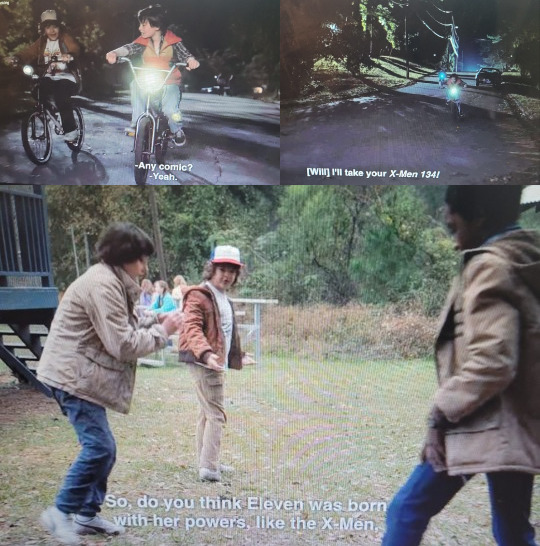
S2)
Will plays digdug (a videogame about underground tunnels) so the mf creates tunnels. Will's dog dies so demogogans become demo-dogs. He also watches Ghostbusters- where a character is possessed by the ‘gate keeper’ and can control demon dogs. So this happens to Will too -similar to s1 with poltergeist .In s1 , Hopper even mentions the book Cujo about a violent dog, who is replaced by a new dog named ‘Willie’ (to allude to this).In s1 we see Mike holding a drawing of Will’s- where Will's wizard has lightning powers (coming from his hand). everytime Will uses tech in s1, the phones explode and lighting appears out of them- hopper makes a BBQ joke about the burned phones.later in s2 the mf has these same lightning abilities and the lab technician makes the same BBQ joke.Joyce even describes the tunnels of the mf/ that Will’s draws as “like lightning.” We also see the russians eviserated by lightning next season too.

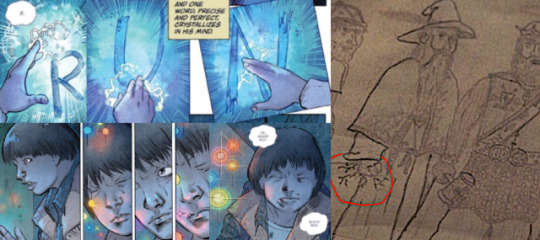
A lab tech calls Will a wizard-and they monitor his brain waves, record him on video, just like they did to El .(when the mf first appears at Will’s house- the lab techs even notice ). The drawing of the mf is next to a baseball (Lonnie ref) and Will says it was a drawing for a story he wrote. In s2 Nancy describes the mindflayer (but she’s actually describing Will).“So this thing is like a brain that’s controlling everything.”Because it’s not the mindflayers’ brain - it’s Will’s brain controlling everything. ( a “hive mind” aka the mf/WILL share a brain ). Owens in s2e1 (BEFORE the mf possession) says Will's ‘anniversary affect’ would make him remember “tra*matic memories” and “OPEN the neurological flood GATES” (aka Will’s neurological GATES are the gates between the real world and upsidedown - which are connected to the mf).
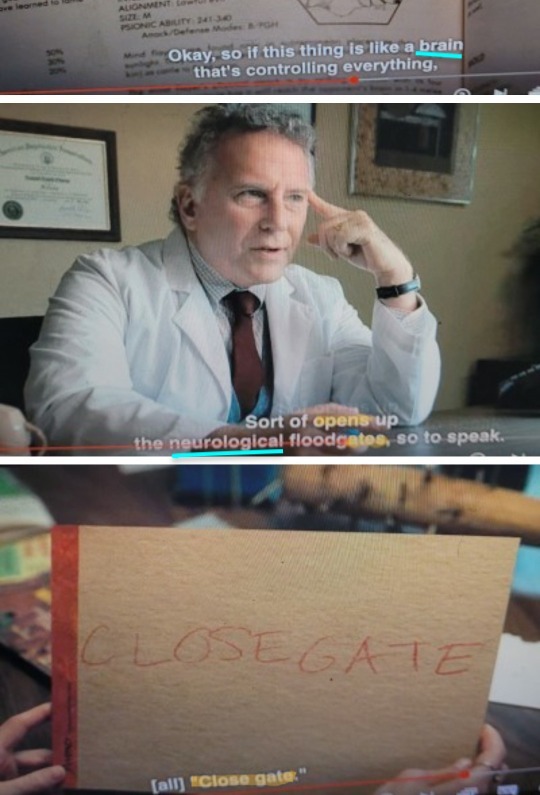
Owens in s2e1 (after mentioning the “gates”) even says Will's ‘anniversary affect’ / “tr*umatic memories” would cause temporary “personality changes”for Will (the later mf possession) . I mean... Owens wasn’t entirely wrong was he? Will even feels the back of his neck in s2 and says it has to do with “memories” ...and in s3 feeling the back of his neck meant Will was sensing the mf. Similarly, before his possession-mr clarke mentions phineus gage who after an accident had a “complete change to his personality” (and the shot pans to Will).

Nancy even calls the mind flayer the “mind-flamer”- hinting at it’s connection to Will the wise who has fire powers). And Dustin says the mf “takes over minds with it’s highly developed psyionic abilities “ And to “summon an undead army... cause the mindflayer loves brains ” ( and in s3 the mf creates a undead army by taking over people’s brains). Hopper even says “So how do we kill this thing shoot it with fireballs ?” (which destroys the flesh-monster in s3) ”
S3)
Will (the “zombie boy”) writes a story about juju zombies after watching a film about zombies at starcourt in s3 - then the mf creates a undead army -which was also foreshadowed in s2 (and similar to Will’s s3 d&d story). We also see Will wrote this d&d story in front of "the thing" poster. So the mf creates a flesh monster resembling the creature in that film too. We also see someone get bit (el) like in Will's story and when his friends retcon his ending to be about “sacrificing themselves via explosion (Hopper).” Will just says “fine you win” (so it ends that way).Also, the shadow monster is now called the Mindflayer - and mimics the mf from d&d (both can control rats with their powers in the show/game).

Will in s2-3 grabs the back of his neck and he attributed it to “memories”, “dreams”, and sensing the mf. Will created castle byers after his dad left and he grabs the bat in cb which was next to the Will the wise drawing (similar to how the baseball was next to the mf drawing in s2) and destroys cb with said bat . Then Will touches his neck and admits the mf has returned. EVERY moment Will senses the mf can be loosely connected to Lonnie. Lonnie used to call him h*mophobic sl*rs so anytime he subconsciously thinks of his feelings towards Mike the mf appears-1st time it’s on one of their ‘movie dates’, 2nd time when Mike and El walk off together down the hill to make-out, 3rd time right after he smashed castle byers after Mike says “it’s not my fault you don’t like girls”, 4th time (after the fight with Mike) when Billy is yelling to open the door (a trigger) and confides in Mike, 5th time when Mike asks him to go away so he can talk to El in the hospital waiting area, and 6th time when Mike says he loves El. The 7th time is when Jonathan is fixing up a car -something Lonnie used to do.Lonnie fixes up cars as a hobby-showing his remodeled car to Jonathan in s1 . Will then senses the mf and grabs his neck-which he said are connected to old “memories”. max and Mike are silent until Jonathan says says “got it (the distributor)”. Then Mike screams for his older sibling. We also see in s1 Jonathan checked to see if Lonnie threw Will in his trunk- something the mf does to some of his victims in s3.
Dustin and susie sing “never ending story”- which is literally about a seemingly normal boy named Sebastian with a bowl cut (from a single parent home) subconsciously making a fantasy world being invaded by a dark force (representing the loss of hope/dreams) that only his imagination powers can fix . “make believe i’m everywhere ... what you dream will be...Rhymes that keep their secrets Will unfold behind the clouds.And there upon a rainbow Is the answer to a never ending story” . Cough-Will’s rainbow ship he CREATED.Both times the lyric plays “Rhymes that keep their secrets WILL “ ( it pans to Will).

The film also follows a false chosen one who everyone says is supposed to save fantasia- named Atreyu (el). Specifically, for that plotwist that Sebastian (Will) has to be the one to do so , not Atreyu (who sebastian subconsciously created). In the novel/film-Atreyu ( the child who was deemed the ‘chosen one) is knocked from Falkor’s back, and into the sea of possibilities. There he wakes on the shore of abandoned ruins.

“There Gmork (The Mindflayer) reveals himself, having been lying in wait.And then latches his jaws onto Atreyu’s leg.”

-Before the duet, Susie tells dusin she’s reading “ a wizard of earthsea” and says ged is about to save his world. The book is about a boy-wizard named Ged (Will) who casts a powerful spell, but the spell goes awry and instead he releases a shadow creature! The new Archmage, Gensher, describes the shadow as an ancient evil that wishes to possess Ged. But the ‘shadow’ turns out to be a representation of the darkest aspects of his personality. And the only way for the world to be saved is for the 2 to merge and for Ged to accept himself .

-Will says he’s a wizard ( writing on a music tape in s3 “will the wise-wizard mix’ and having his password for castle byers be ‘rhadaghast’- a lotr wizard). The way they describe d&d Wizards matches Will/mindflayer perfectly “Wizards are adepts and magicians who combine according to the type of their spells. Relying on the subtle weaves of magic that permeate the universe, wizards are able to create spells of explosive fire, sparking lightning, subtle deception, and gross mind control. Their magic summons monsters from other planes of existence, predicts the future, and turns defeated enemies into zombies. Their most powerful spells can transform one substance into another, summon meteors from the sky, and open portals to other worlds” (all these powers Will the wise/mf are implied to have)
- Stranger things d&d comic (published post s3) : Will creating a illusion army of monsters -as Will the wizard.
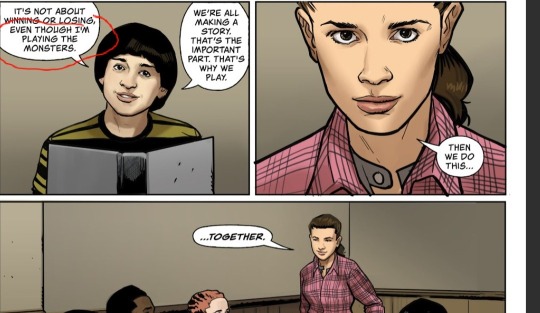
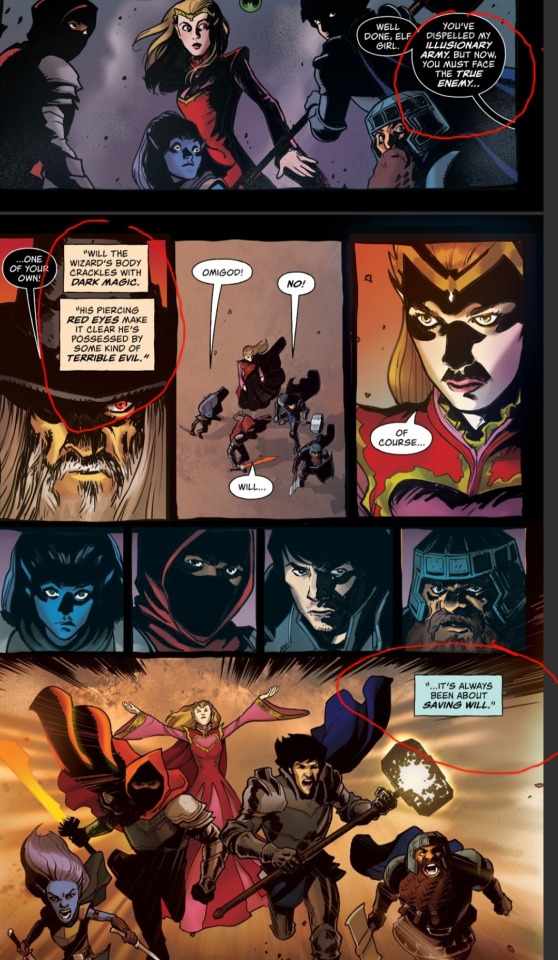
- stranger writers twitter reffed several movies which discuss artist/writer WILLiam Blake who helped make the art exhibit “worlds turned upsidedown”
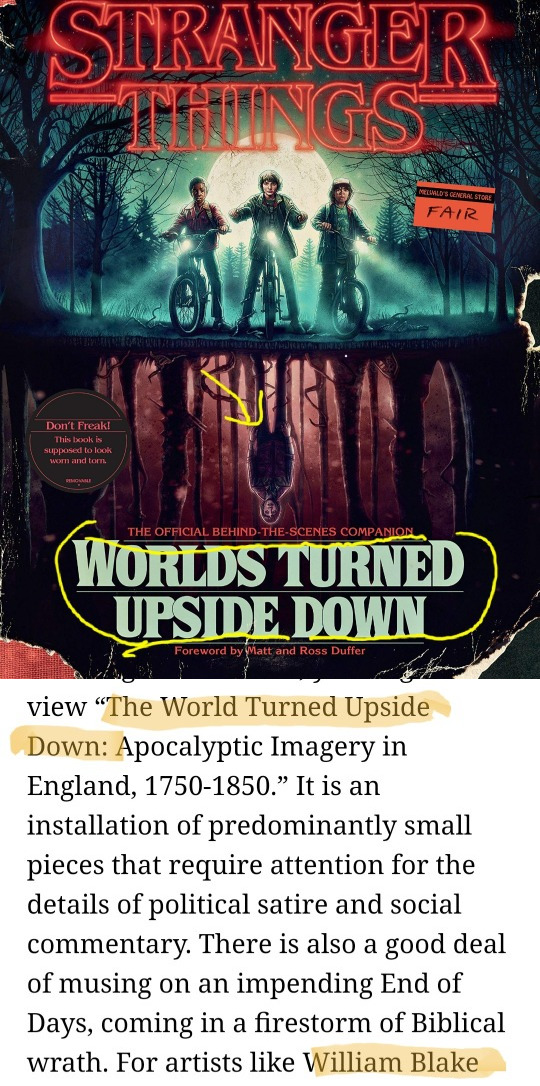
possible reason for the flayed eating chemicals& fertilizer (in s3)
full link/credits here. Lonnie’s gf has a biker shirt from Harley davidson- with the eagle logo and their saying “live to ride’. Which would imply lonnie is also in such biker circles. Harley davidson in the 80s had dr*g gangs too (primarily m*th).
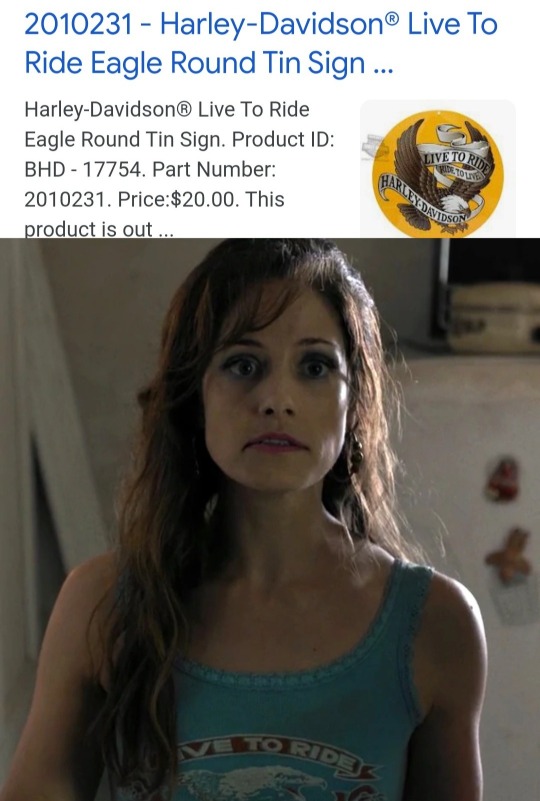
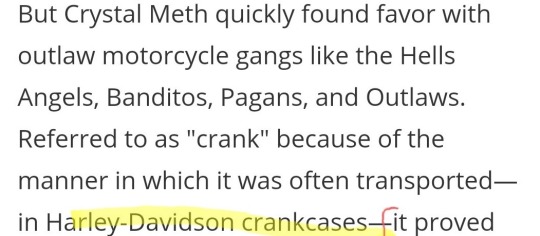
One reason m*th is so prevalent in rural areas is that it can be formulated, or “cooked,” by small producers and one of the ingredients is readily found on most farms – anhydrous AMMONIA fertilizer. Both farmers and chemical suppliers have experienced thefts of anhydrous particularly in the Midwest.“

WHICH REMINDS ME OF the FLAYED EATING FERTILIZER AND CHEMICALS IN S3 . Nancy even says farmers/chem suppliers are having fertilizer stolen! And she later thinks flayed tom was on drugs- “A mysterious case of the missing fertilizer- a Nancy Drew Mystery”. This is also in the same season one character (who looks a bit like Lonnie) is a biker is corrupting the town.
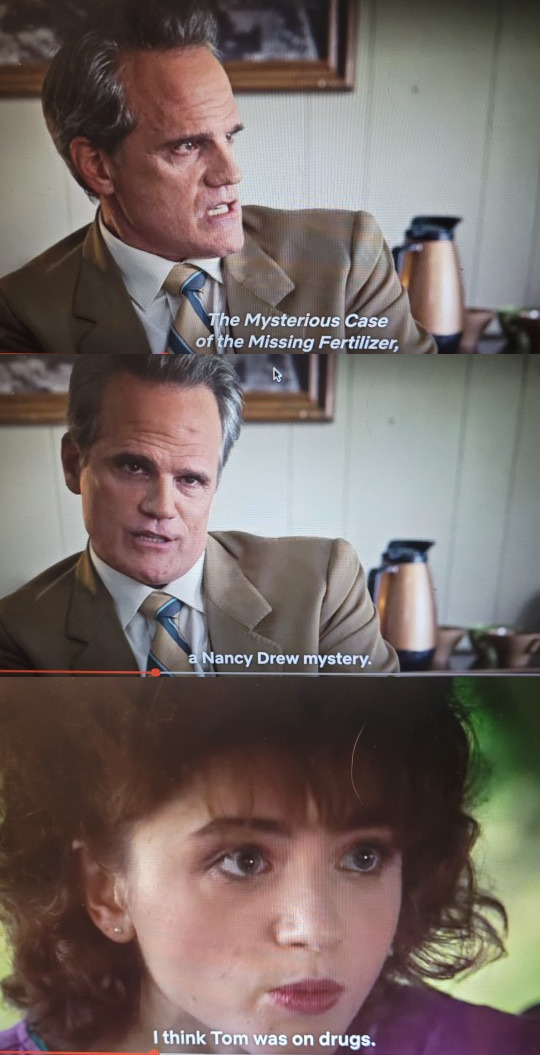
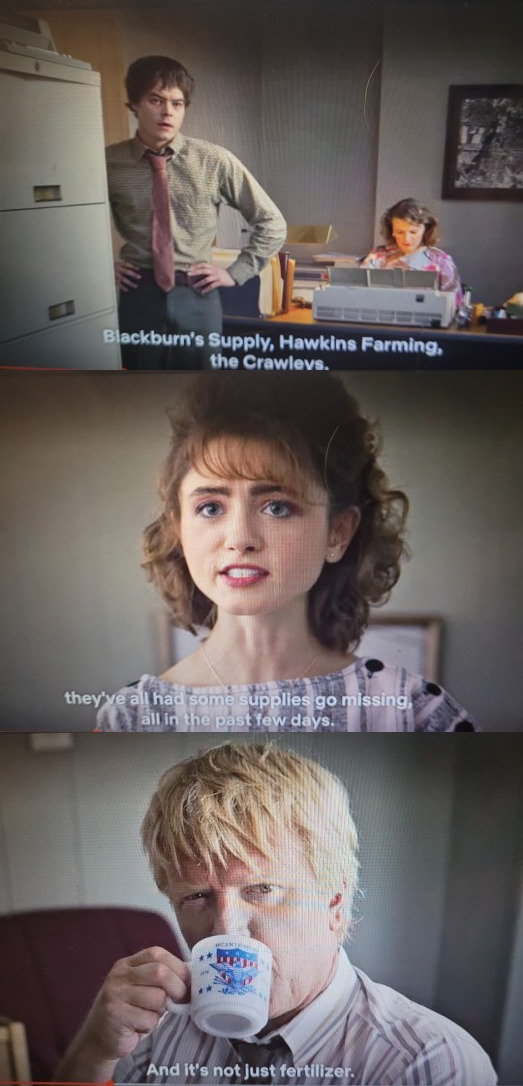
Will creating /basing the supernatural from suppressed memories -means it’s from a very young child’s perspective . young Will would equate people eating chemicals, ammonia fertilizer, and ammonia... to using those SAME chemicals to create m*th and then physically consuming them . Why we see mrs driscoll eating fertilizer & Billy drinking ammonia.

The reason the flayed started behaving differently is probably because in s2 Will was forcibly injected with a needle & woken up with ammonia by Hopper-jogging some of those old memories.
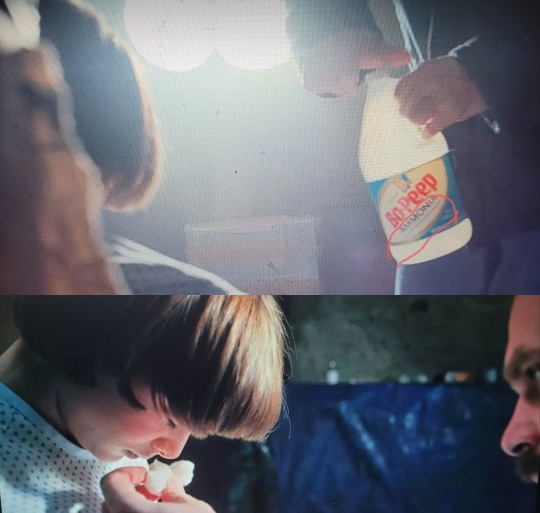

EVEN Nancy’s proof Tom is on dr*gs is a symptom of m*th use or withdrawl from it-excessive sweating (like all the flayed in s2-3). M*th causes hyperthermia (body is at a higher temp than usual)-so they like it cold!!!!! Even clammy hands that she mentioned is a symptom of m*th use. in children it can even cause seizures- like Will :(

And when m*th is made via fertilizer it first is made into a highly corrosive liquid which is sometimes green-like the Russian lab.“six pounds of toxic waste is created for every pound of m*th manufactured. The waste is often dumped on farms, in rivers and and is harmful to the environment.” Like all the chemical leaks relating to Hawkins lab/mf that affected the crops in s2/this pic of water in s3.

m*th was even called ‘bathroom crank’-which is sketchy given the bathtub is what mf fears and how the sensory deprivation tank is also called a ‘tub’ by el . Becky even said Brenner would get terry high and throw her in the tank/tub.
It also does take some chemisty knowledge to COVERT various substances (including fertilizer and other chemicals) to make m*th- which reminds me of the kids saying they can convert one substance into another (when explaining why the possessed are eating chemicals)- they say they’re making a new chemical “in themselves”

other hints
Will’s b day is march 22 . Which is when “fire burns most brightly” and his ‘birthday number is number 7′ (”it was a 7 the demogorgan it got me′) . The number 7 is specifically associated with “wisdom and psychic abilities”. His b day even adds up to 7 (3+2+2).His horoscope is also influenced by the shadow god-ketu (who is also associated with wisdom and psychic abilities too).

* There’s way more details/depth/ other st inspirations in my DID analyses -specifically pt 2. (where i discuss how the mf/upsidedown connects to the numbers/russians- and also specifially Will).But this is just a crash course about the flayed/upsideown/it’s creatures connect to Will.
People will dismiss all of this as just the Duffers liking to reference random things they like/ and foreshadow via d&d without any in universe reason. but I really think that’s a disappointing explanation/outcome. Especially the predictable cliche theory that the mf is just experiment #1. Not only is it boring, cliche, and predictable af- but it doesn’t line up as well with the mental health themes mentioned in ever season.Will created everything via tr*uma cause of his dad- and overcomes this: is not only a “twist” that will make rewatching more enjoyable given all the hints- it’s more narratively sound given how much the series touches on themes such as overcoming tra*ma, mental health, and problematic fathers. The #1/ex experiment=mf theory doesn’t explain why they made the supernatural connect to Will in this way . And with such a boring cliche ending it would quickly be forgotten like other big sci-fi/fantasy shows that quickly lost relevancy after being popular: like heros, g.o.t, etc.One makes the show cliche another makes it remembered for decades (ex: jacob’s ladder).
221 notes
·
View notes
Note
Hi hi. Just a random idea I thought I would share in the case it might interest you. But sort of like a parallel universe or time travel thing. There's a forest/meadow on earth that is suspended in another time or world. You happened upon it by chance and meet someone there not realising that your lives can only cross in this one place.
inch-resting.....

↳ Snow White and the Park Ranger
2.4k || 100% Light Fluff || Kim Seokjin
Once upon a time—
“Please, let me go!”
—you were birthed as Princess of a marvelous kingdom, as fair as your mother and beloved by all who breathes. But tragedy appeared when your mother passed. Your father remarried a woman and after he, too, passed, your step-mother became Queen.
She was consumed by her jealousy and banished you from the castle.
And now, you were fleeing.
“I beg of you!”
The leaves of the Enchanted Forest crunch beneath your quick steps. A twig snaps as a cry befalls your trembling lips. You continue running, grasping fistfuls of the yellow shirt of your dress as you weave between the grandiose trees cloaking the sky with their canopy. The darkness is thick, shadows that whisper with beasts lurking amongst the wooded thicket.
But you are far more fearful of the Huntsman trailing after you.
He brandishes a sharp knife, gripping it at his shoulder. You turn at your shoulder to find him close and you shut your eyes as you brush past another tree. Someone save me! Please!
Bring me away from this!
As if the magic of the Enchanted Forest answers your desperate pleas — suddenly there is a man standing in front of you.
You are unable to slow your steps and you run into his firm chest. Yet, luckily, his strong arms reach out and he grasps at your shoulders, so that the two of you don’t collide or fall.
“Woah, woah, woah! Are you alright?”
You look up at your saviour. The person who has rescued you.
And your breath is stolen away from your lips. You wonder if this is what your mother always described to you when she used to read those bedtime stories back when the castle was still your home. You wonder if this is it: love at first sight.
The man has plump, pink lips, sheepish eyes and a sharp nose. He is without a sword, white horse or silver armor. Rather, a flat hat the colour of sand on top of his dark hair. His clothing is strange as well, a shirt of the same shade with an emblem on the sleeve — perhaps his kingdom’s crest — and his long pants are much darker.
But still, he is your prince.
“Are you alright?”
“There is a Huntsman chasing after me!” You turn around, still within his embrace. But as your breath catches up, there is no Huntsman. Have you lost him in the forest?
“I don’t see anyone,” your prince says.
“He must’ve gone when he saw you here.”
You turn back to your prince as he steps away from you, gazing down at your dress.
You feel shy. Your red cape is torn from being twisted by branches and your yellow skirt is dirtied from the mud. You never expected to encounter your prince in the Enchanted Forest. You always thought you’d meet him at a ball. But this dress, although dirtied and not as beautiful as the ballgowns the Evil Queen has, it was sewn by your mother. You cherish it deeply.
“Are you cosplaying?” he asks. “Or filming something?”
“Pardon me?” Your brows lift, unable to understand him.
Your Prince frowns. “Are you here alone?”
“Why, of course, I am. I was trying to get away.”
“You said someone was chasing you? Who?”
“I already said, it was the Huntsman.” You sigh. “Oh, goodness, I do not know why he would do such a thing, but it was quite frightening. I had no choice but to flee as quickly as possible!”
“Al-….right then.” He takes a black rectangle from his pants and you watch inquisitively as he squeezes the side. You’re startled when a noise comes from it. Yet the prince speaks into the rectangle. “Hello? Can we get a medic? We have a lost and distressed...unstable female down just off of the granular trail by the Marshall Springs, west of the river. Hello?”
You’re startled once more when he suddenly hits the rectangle with his hand. “Hello? Can anyone hear? Goddammit, why is it not working?”
You wonder if this is a magical contacting device from his kingdom. Perhaps he’s calling his knights. “Is everything alright, my prince?”
He looks up at you. “Huh?”
“I’m quite alright,” you reassure your handsome prince as a bashful smile comes across your features. “Now that you’re here.”
He’s silent for a few beats and then he sighs, placing the rectangle to hang off the top of his pants again. “Do you know what your name is?”
“It’s Y/N.” Your lashes flutter. “May I know yours?”
“I’m Seokjin, Park Ranger of Wood Buffalo National Park.” He points to the emblem on his sleeve. You’ve never heard of such a kingdom before, but it sounds absolutely splendid.
“Seokjin,” you murmur the name of your prince to seal it into memory.
“I’ll be able to help you. You don’t need to be scared,” he promises and you’re sure you must be dreaming. He is perfect. “Do you know how long you’ve been out here for?”
“Half a day, perhaps? I’ve been wandering the forest for quite some time.”
“What was your last memory?”
“Well, I was picking flowers and singing to the birds, but then I heard footsteps and I turned around and saw the Huntsman and started to flee. It was such a shame as I had to leave my daisies behind.”
You sigh softly, not noticing his incredulous expression and how he takes another step away from you. “Why won’t you take a seat, Miss Y/N. I’ll try my best to contact some help for you and get an assessment done.”
You’re not sure what he means but you nod, deciding to rest at a tree stump. Prince Seokjin tries to speak into his rectangle again, but there is little answer. It goes quiet as the beautiful forest sings, birds twiddling their song and the leaves rustle.
Your prince breathes out and then he looks at you, mustering a smile.
“You must really like Snow White,” he comments passingly.
But you gasp. How does he know the nickname of what the Evil Queen calls you?
No one else knows. Could it be that he’s working for her?
You stand, careening back from him. Seokjin’s eyes widen. “Are you alright?”
“Stay back!” you shout. You can’t believe you were almost tricked!
“Miss—!”
You flee from him.
“Wait!”
You turn around, tears welling into your eyes as you look at him. You don’t notice the rippling effect in front of you, like an invisible wall only visible to the eye if close attention is paid. You don’t notice it until you step past the boundary line and Seokjin suddenly vanishes from sight.
You slow to a stop. What.
You step back and as if the world ripples, he appears again. Right on the spot you last saw him.
You step forward and he disappears. You step back and he reappears.
Seokjin’s mouth has drawn open. He’s as bewildered as you are.

The magic of the Enchanted Forest is wondrous in ways you cannot and will not ever understand. Your mother once told you tales on how the trees are more ancient than mankind. That the fairies and elves, creatures and beasts, living inside have added to its mystic magic that have both answered pleas and punished wrongdoers when harm is done to the forest.
You are sure this is part of the Enchanted Forest’s magic too.
When you cross a certain point of the area, Seokjin vanishes from your sight and you do from his and when he crosses, you vanish from his sight and you no longer see him as well. It’s as if it’s a doorway and this place crosses between both of your paths.
You quickly learn that Seokjin is no prince of any kingdom. He belongs to a different world entirely.
“...and they lived happily ever after. The end.” You close the storybook he’s given to you, stunned at how your entire life has been simplified in these measly drawings and short sentences. “I...have to live in a small cottage with seven small men?”
“They’re dwarves,” he says.
You look up at him. “And I’m given a poison apple by the Queen?”
“Well, you’re saved by a handsome prince who gives you true love’s kiss…?”
“This is awful!” You sob out and the book falls to the ground. “I don’t want to return!”
Seokjin is wide-eyed, not sure what to say.
“I don’t want to live in a house with, with, with—”
“Dwarves,” he finishes.
“—or be poisoned and brought to an endless sleep, waiting until a prince’s lips touches mine, so I can wake up and live in his kingdom as his!” Hopelessness makes tears well in your eyes.
You were waiting for someone to rescue you — your prince and one true love. But now that you know what will eventually happen, you’re heartbroken. You thought once you were banished from the castle, you could live a peaceful and happy life. But there was still so much waiting for you.
You never return home. Yes, you meet your true love and the Evil Queen dies. But all that misery for a happy ending? The end doesn’t justify the means. It was still frightening. You’ve been chased by the Huntsman already and that fear is enough to make you tremble now. You can’t imagine living with seven small strangers, being poisoned, and brought to a deep sleep while not knowing when you will wake up again.
“I won’t leave,” you decide, placing your foot down.
It seemed like no one could enter this place except for you and Seokjin. The Huntsman couldn’t come when he was right behind you, so you’ll be safe from the Evil Queen and her henchmen.
“What?” Seokjin looks at you, blinking.
“I’ll stay here.”
He looks around the empty forest, appearing at a loss. His mouth opens, closes and then opens again. “I can’t in my good conscience leave a young woman to fend for herself.”
“Why not?” You tilt your head, unable to understand his concern. “I may not be able to defeat my evil step-mother and her magic, but I know the forest well enough and can still fend for myself.”
To prove it, your lips part and you start to sing.
At once, the birds hop from their branches and fly over to your feet. The squirrels emerge from their homes, rabbits from their burrows and a doe peeks out from the thicket. Seokjin is startled, taking a step back at all the animals and forest creatures emerging. Perhaps if he did not truly believe you were Y/N, Princess of your kingdom, and also Snow White from his storybook, he does now.
The creatures scurry away in disappointment when you stop singing.
Seokjin appears surprised. “Your voice is lovely— but I know this place might be your….your…”
“Enchanted Forest.”
“It might be your Enchanted Forest, but it’s also the Wood Buffalo National Park. It could have bears, wolves and bison. It’s dangerous. Especially at night.”
You look at Seokjin. Seokjin looks at you.
He ultimately sighs.
Throughout the next few days, Seokjin brings you supplies. He teaches you how to set something up called a tent and it’s absolutely wonderful to sleep in with the makeshift bed he calls a sleeping bag. He teaches you how to start a fire, brings you a chair that you can easily open up and a lantern for the night.
It starts to become a wonderful place, filled with knick-knacks such as the box that makes a fantastic drink called coffee to a bigger box that’s cold and holds in snacks he brings to you. He tells you these things can run on ‘solar power’ which is power from the sunshine. It’s magic.
Seokjin might not be a prince, but he is a kind man.
You also learn his job is a noble one. He walks through the forest and protects the creatures and heroes that wander in it. And while you may be from vastly different worlds, if there’s one thing you both have in common, it’s how much you cherish and love nature.
“I would like it if you could possibly bring me a shield or perhaps tools of some sort. Any scrap materials that you have no need for.”
Seokjin frowns, seated next to you on the log as he roasts the sweet treat called a marshmallow. His face is warm and glowing by the light of the fire. The forest is quiet but it feels peaceful. You find it’s always peaceful when he’s by your side. “What are you going to do with it?”
“I think I’m going to train and defeat the queen.”
“What?”
You roast the white puff until it’s golden on all sides. “I’ve been thinking that while I want to stay here, I don’t know if it can hide forever. I am not truly free until the Evil Queen has been defeated and I do not want to wait until she poisons me.” Your gaze meets his. “I want to protect myself.”
For the weeks that follow, you fashion sheets of metal into shields and weapons. Seokjin brings you a bow and arrows, and shows you how to shoot. You practice without rest on apples that you collect from the tree by the boundary line. That fruit has become your one true nemesis.
The arrow spirals out and thunks straight into the middle of the apple. It smacks into the trunk of the tree.
“Nice shot!”
You set your bow down, smiling widely at Seokjin who’s been watching you fondly.
“What are you going to do after you defeat the queen?” he asks in a murmur later that evening whilst helping you prepare dinner. He’s been coming to visit you every day now, after his work he says. You’re thankful for it — his company is something you’ve grown to yearn for.
You hum pleasantly. “I don’t know. Perhaps I will return. Don’t you think a cottage would be pleasant here?”
Your face lifts to find his softened gaze. He looks away just as quickly, yet he still murmurs, “Maybe I could bring you supplies.”
The two of you shyly smile to yourselves.
Seokjin may not be a prince, but he might just be the one you love.
#bts fanfic#bts scenario#jin fanfic#jin scenario#jin fluff#seokjin fanfic#jin reader insert#seokjin scenario#randomness4u#Jimlings
124 notes
·
View notes
Text

(Screenshot borrowed from @ohsnapitzlovehacker)
First off, I'm glad Andrew stepped up for his colleague, and talked about the treatment he faces vs what his fellow female writers of colour especially have to face for their written work for PB - in this particular case, ones where they are book leads. I'm just expanding on his argument with what I've observed, and in no way am I trying to justify the premise in QB itself. I'm just pointing out a pattern I'm not often seeing over here.
Andrew Shvarts was the Book Lead for Bloodbound, from start to end. Mind you, this is the same book that ends...by killing off either a black woman, or an Asian man, for no other reason than to advance the MC's storyline and complete her transformation into a goddess - and in fact Lily was subjected to this sort of fate twice (she is almost murdered by Jameson so that the MC can be even further embroiled in the vampire world, then killed in certain playthroughs). (Also, for someone who seemed to show such a disdain for capitalism in some of his tweets, the involved-in-genocide CEOs in his story sure seemed safe!)
As far as I can recall, even though there was criticism of this storyline from the fandom - Andrew as Book Lead wasn't subjected to this scale of criticism. His next book as lead writer, Blades of Light and Shadow, was celebrated the moment it came out. He was widely credited for it and I'd seen many posts praising him for his writing, and often his tweets as well. Many in the fandom still praise him heavily despite the fact that his first book as lead writer pretty much killed off two default characters of colour arbitrarily.
Here's another example. Jennifer Hepler, the book lead for A Courtesan of Rome. The fandom was constantly showing her (personally) their appreciation for her writing of Mark Anthony, and the book despite its imbalances and highly problematic elements was praised and is still remembered with fondness. Jennifer was so essential to the writing of the book that they preferred to rush the end of ACOR so she could finish it, rather than hand over the reins to anyone else.
ACOR was a book that allowed for a black colleague of the courtesan!MC's to be slut shamed both by the MC and her admirers, and ended with said black woman being sent to slavery, with two black people laughing at her plight. I saw a number of posts that highlighted exactly how horrible and damaging this sort of writing was, but the backlash was never so intense that the writers had to come out and explain the way Chelsa had to this week. Jennifer was also remembered with great fondness, and when her return to PB was announced long after, the fandom as a whole celebrated it. I didn't really see Jennifer take this much heat for these racist subplots, and I didn't see the fandom as a whole reminding us of any of this when her return was spoken about.
It's not that there were no criticisms of these storylines specifically. There were plenty. But it's a fact that majority of them were addressed to, or spoke about, PB. It acknowledged that often the company and higher-ups were the ones in power. So it's extremely suspect to me that fingers are immediately pointed at CHELSA the moment news of this storyline came out. That hate was addressed to her personally, questions upon questions were asked to her personally - to the point where her white male colleague had to step in to point out the double standards.
How is it that Andrew can be seen as separate from the decision to kill off either Lily or Jax, or Jennifer from the decision to send Xanthe to slavery, yet the immediate knee-jerk reaction to a potential student-teacher storyline is to directly point fingers at the black...female...Book Lead? Not to mention there were plenty of relationships in earlier books that involved power imbalances of some sort or other - including one that featured a character himself notorious for a student-teacher "relationship" in a previous game (Thomas Hunt), who was then made the "hero" in a storyline that should have centered around sexual harrassment in the film industry. How is it that we will draw a line at student-teacher "relationships" in this particular case (which is a good thing, yes we MUST raise those issues and acknowledge how triggering and disturbing they can be - but we can do that without cherrypicking like this)...but not racism within narratives - the kind of racism that goes unchecked and unacknowledged, that is often normalized by narratives in other PB books? Is the latter so unimportant, so...normal to you??
I'm not saying you should go and flood Andrew or Jennifer or ANYONE'S DMs with hate or threats. You should never do that, that should never even be an option! Nor am I insinuating that the concerns about Queen B's subplot with the professor aren't valid. What I'm saying - and what I've seen other black players say better than I have - is...if you're going to expand this much energy hating on the lead writer for this storyline, but not on some of the other lead writers for stuff that is just as - if not even more - disturbing...you'll need to examine exactly why that is. And I can assure you won't like the answers.
327 notes
·
View notes
Text
‘Prospect’ Tropes
Here’s some of my favorite tropes that tvtropes.org had for Prospect:
(hiding under spoiler cut in case any Pedro fans on here are still planning on watching it)
Affably Evil: Ezra is a bandit, but also very friendly to the person he's robbing. (of course I argue that Ezra’s not evil, just morally gray)
Bittersweet Ending: Cee's father is murdered and she misses out on a huge payday, but she manages to return to her ship. Meanwhile, Ezra has lost an arm and is critically wounded, but he's redeemed himself somewhat. If he survives, they will presumably continue their partnership. (Yes, that is everyone’s agreed upon consensus who’s seen it! Anything else is unacceptable!)
Blatant Lies: When the locals insist on playing a dreary song on a concertina-like device before trading, Ezra glances awkwardly around the tent waiting for the song to end, then states earnestly, "That was beautiful!"
Chekhov's Classroom: Cee's father mentions a few pointers on how to extract the alien gems, which establishes that making a mistake will destroy the gem. Cee tries to do it herself in the end but fails, destroying the gem. He also mentions that if the chemical agent used to clean the gem touches alien meat, it will cause a tremendous explosion, which is used by Cee to blow away a few mercenaries at the climax.
Cryptic Background Reference: Characters often refer to fictional places and things in familiar terms without explaining them.
Decoy Protagonist: Damon, Cee's father, is one of the only two characters in the opening act of the film, but he dies and is replaced by Ezra for the remainder of the film.
Establishing Character Moment: Cee is first seen listening to wild music, gazing out of a window and scribbling in her notebook while sitting in an otherwise stark room, establishing her need for escape from her present surroundings. She later confirms that she writes in her notebook as a means of escape.
Fire-Forged Friends: Cee and Ezra. Ezra kills Cee's father, but their fates are bound together, and by the end, Cee rescues him when she could have simply left him behind. (Yes--this!! Fire-forged friends is exactly what Ezra and Cee are)
Heel–Face Turn: Ezra goes from villain to second protagonist.
I Will Only Slow You Down: when Ezra is badly wounded in the final encounter, he tells Cee to go on without him.
Mercy Kill: Ezra delivers the final blow to Damon. When Cee accuses Ezra of killing him, Ezra says that she is "technically" correct, suggesting that he views the action as a mercy kill.
Pet the Dog: The first indication that Ezra might not be completely irredeemable is when he tells Cee to blame him for the death of Damon rather than herself.
Quick Draw: Ezra has one with a railgun "thrower" pistol.
Show, Don't Tell: The film features very little exposition to explain things, preferring to let viewers figure things out and fill in the gaps themselves.
Show Within a Show: Cee is big fan of "The Streamer Girl" young adult novel. She lost her copy of the book but had read it so many times that she was able to write the storyline into her own journal.
Space Western Prospect takes its cues from the gold rush era of the American West, down to its grizzled miner Ezra's quick draw and drawl.
Teeth-Clenched Teamwork: Ezra's first interaction with Damon and Cee is to try to rob them, but it soon turns out that they will only get the gems and get off the planet if they work together.
Troubling Unchildlike Behavior: Ezra is understandably disturbed by teenage Cee's utterly calm demeanor as she amputates his infected arm with a bone saw.
Used Future: On top of the Cassette Futurism, the retro technology seems to be somewhat old and dated even by the standards of the setting. Since we're dealing with cash-strapped people on a distant frontier, this is to be expected.
You can read all of the tropes here:
https://tvtropes.org/pmwiki/pmwiki.php/Film/Prospect
#prospect#prospect movie#pedro pascal#sophie thatcher#jay duplass#prospect ezra#prospect cee#prospect damon#zeek earl#chris caldwell#tv tropes
23 notes
·
View notes
Text
183. porky’s double trouble (1937)
release date: november 13th, 1937
series: looney tunes
director: frank tashlin
starring: mel blanc (porky, killer), tedd pierce (narrator), sara berner (petunia)
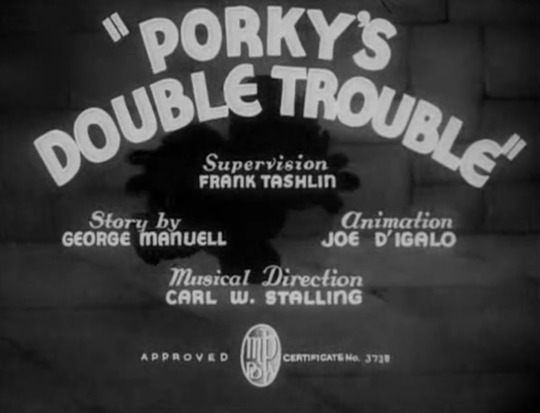
the end of an era—this is the final cartoon to feature “fat porky”. though he’d been dieting since late 1936 and steadily throughout 1937 with the other directors, frank tashlin was the last one to skinny him up. ironic, since he was such a stickler for streamlined designs! nevertheless, this is an exciting change, as porky is finally completing his transformation into the pig we know and love today.
not only that, this is the final appearance of frank tashlin’s petunia as well. she’d go on a hiatus all throughout 1938, only to be revived by bob clampetts with a totally new design in 1939. unfortunately, she was only kept for two more shorts before being discarded again. parting is such sweet sorrow!
we deal with not one porky, but two: an escaped convict kidnaps porky and steals his identity in order to successfully rob a bank. it’s up to petunia to put a stop to this criminal’s crime spree... or is it?
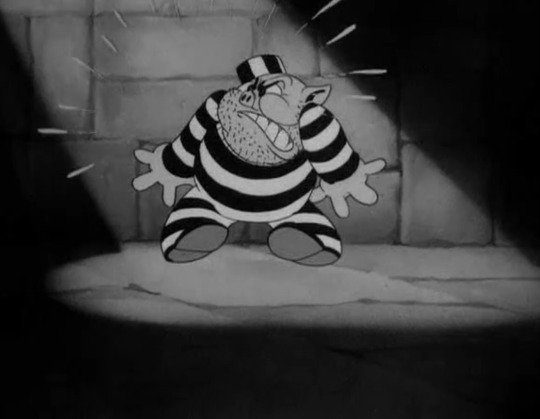
a silhouette of a pig furtively creeps under a blanket of typography from the title card. the pig isn’t our favorite stuttering porcine, but rather a grisly, stubbly porky doppleganger attempting to escape from prison. he jumps and growls at the spotlight that shines on him, shooting at the offscreen subjects. not only does he whip out two pistols, he even flips them--such a small detail of flamboyant dramatics goes a long way.
prison guards shoot back at the convict, silhouetted against the night sky, illuminated only by the glow of the searchlight and the stylized white bullets raining down below. the composition is stellar, its flatness reminiscent of the backgrounds of the early ‘40s cartoons, primarily from the likes of frank tashlin, chuck jones, and even norm mccabe at times. a whistle screeches as the prisoners run along, rifles in hand. in all, the dramatic opening rampant with silhouettes feels quite reminiscent to the opening of little beau porky, another tashlin entry just a year prior.
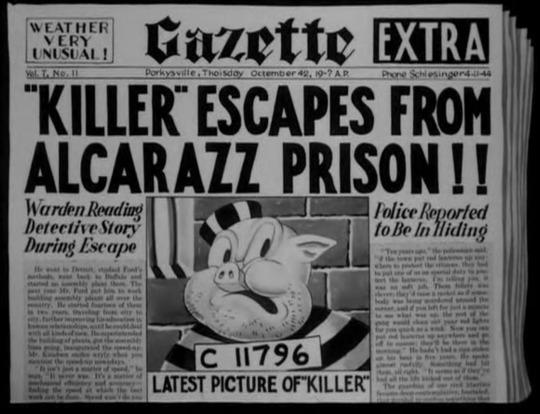
callbacks are more blatant as we undergo the signature Frank Tashlin Expositional Montage, footage of cop cars racing out into the street reused from tex avery’s the blow out, while a close-up of a newspaper press is also reused from avery’s porky the wrestler. all the while, a shot of the convict, identified as “killer” by one of the newspapers in the montage, oversees the chaos, his eyes drifting along to survey the action, his lips parted in a sneer. the narration (tedd pierce?) is the cherry on top--often times, narration has a tendency to feel redundant, as if it’s a crutch to support the gags (i.e. some of tex avery’s earlier entries), but here it elevates the theatrics of the entire prison escape.
speaking of narrators, ours introduces us to a gangster hideout--an abandoned all girls school by the name of katz school for girls, a nod towards studio business manager ray katz--no doubt a place frequented by killer. tashlin’s cinematography is in full swing as we iris in on an exterior shot of the hideout before panning along the interior, an arsenal of weapons littering the schoolroom of years past. a smooth, clever transition of pans from the classroom to a grandiose hallway, focusing on a door.
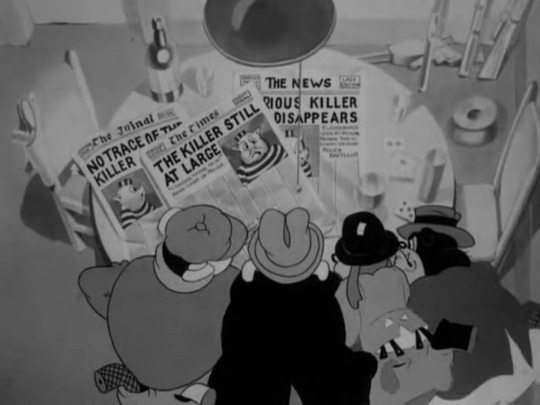
killer’s lackeys crowd around a table littered with alcohol bottles and playing cards, but most importantly, newspapers highlighting killer’s escape. his cronies all mutter words of praise in thick brooklyn accents (”yeah, dis guy’s clever, jus’ like who-dun-y! he can get outta anyt’ing!”). the conversation between the gangsters is surprisingly natural and fun to listen to: one of the lackeys likens killer to “clark taylor”, a humorously false remembrance of actors clark gable and robert taylor combined.
knocking outside the door prompts the cronies to whip around with their guns drawn, all crowing “who’s ‘dere!?” in unison. outside the door stands a rather spherical caricature of mae west--if there’s a mae west cameo, it must be a ‘30s cartoon! funnily enough, tashlin gets an animation credit on buddy’s beer garden, a cartoon whose mae west caricature is relatively integral to the plot as well.
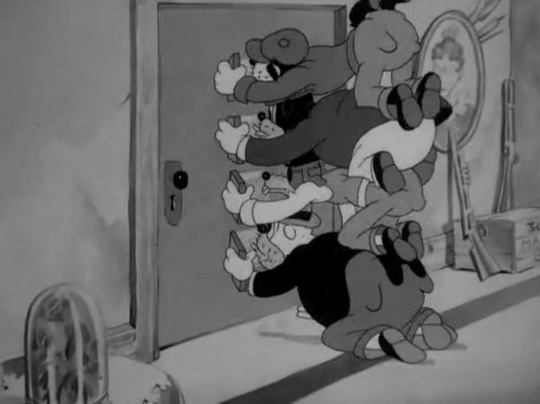
mae informs the boys that she comes peddling a message from killer. furtively, they all crowd around the door, stacking on top of each other, each peering out of their own peephole door. the silent film inspiration is strong in this shot. not only that, its composition also reminds me of some of the shots in tashlin’s porky pig’s feat, a personal favorite of mine.
all hesitation to let newcomers in is dropped once the cronies spot their curvaceous company. they’re instantly smitten, batting eyelashes and all, one of the cronies going so far as to stroke mae the messenger’s face. tashlin’s cartoons always had a promiscuous flair to them, especially in the ‘40s--here is no exception. perhaps it’s only natural, seeing as this entire cartoon is one large parody of all of the gangster pictures churning out from warner bros. at the time (marked woman, kid galahad, san quentin to name a few.)
“he said...” mae lunges a haymaker, causing all four cronies to domino together and knock into the door as mel blanc settles out of his falsetto, “NOT T’ FOOL AROUND WITH DAMES, YA LUGS!!!” killer strips out of his outfit (even removing an iron barbell from where his chest is), growling “let that loin ya a lesson!” as always, mel is fun to listen to--his falsetto voice sounds rather similar to the voice he’d use for his lou costello caricatures.
killer eyes a stray newspaper, gloating “once i was only public enemy numba NINE!” at the sight of his new title as public enemy #1. (it should be noted that in tashlin’s first picture, porky’s poultry plant, another “public enemy” gag is used. gag continuity is always fun to see!) his eyes drift over to an article on the other side of the page (if you look closely, the date is “thoisdays octember 42nd”, the paper addressing the denizens of “porkysville”.):
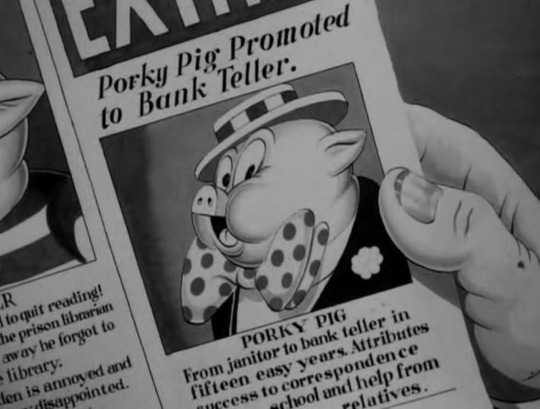
“hey! what’s dis? da guy looks just like me! he could be me twin brudda!” frank tashlin’s disgruntlement with porky can be felt multiple ways here. not only did he hesitate until 2.5 minutes into the cartoon to introduce him, the underscore is “puddin’ head jones”, a frequent score associated with porky on numerous occasions offering not-so-subtle commentary about his intelligence (or lack thereof.)
killer ushers his lackey to take a glimpse at his bank-teller doppelgänger, whispering a plan to them involving porky and the bank, the narrator clueing us in that “the evildoers carefully plan another hideous crime.”
it’s not a tashlin cartoon without his signature up-shot: we iris in on an impressive up-shot view of “worst national bank”, a score of “plenty of money and you” and even the extravagant car horn of a limo solidifying that yes indeed, this here’s a bank! inside, porky dutifully deposits the goods of his spherically designed patrons. even by 1937, these mathematically proportioned designs were out of style--i suppose tashlin got the memo, though, seeing as this is the final “fat porky” cartoon, indicating a transition into more modern, streamlined designs.
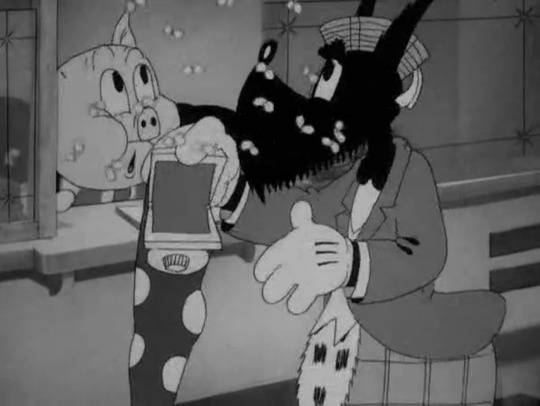
bob bentley animates a close-up of porky depositing the cash of a scottie dog. cue the ever prevalent “cheap scotsman” gag, the scottie’s coin purse (a sock with a lock on it) revealing a swarm of moths upon its opening. he deposits a lone dime, porky happily obliging to sign the bank book. the scottie leaves, and it only takes a few bloated seconds for porky’s brain to catch up with him, realizing that he just signed a bank book to deposit a measly dime. he smacks himself in the face, a carl stalling favorite cue of “you’re a horses ass” providing musical commentary as porky glowers into the camera, hand sliding down his pudgy face. stereotypes aside, this is a fun little scene. it gives porky some personality, accentuating his gullibility (a persistent factor of his character, no matter who is directing him), and bob bentley’s animation is extremely appealing. no discretion to volney white, who animates the next scene, but there’s a noticeable difference in bentley’s and white’s styles, bentley’s animation much more dimensional. i absolutely love how he draws porky.
secretary petunia, once again voiced by sara berner, coos at porky to come over to her desk. she wastes little time flirting with him, asking that the two “step out” for the night. volney’s animation of porky is hysterical--his discomfort is exceedingly visible. porky gets cold feet, a stuttering mess (more than usual) as he sputters “geh-eh-g-eh-g-g-gee, miss petunia, i’m, uh, buh-beh-bashful... huh...heh, you’re so eh-peh-purrty, and eh-uh-i’m, uhh... yee-you’re, uh...” cue one of my favorite deliveries ever by mel blanc as the lunch bell rings. porky grins, realizing he’s saved by the bell. he doesn’t stutter once as he declares breathlessly “it’s time for lunch, g’bye!” and rushes off. the comedic timing, both from mel’s delivery and volney’s animation, couldn’t be better.
porky strolls outside, where he stumbles across killer (disguised as mae west again) hammering away at a car. porky’s good nature prevails, which often leads to trouble: with a polite tip of the hat, he asks if the woman needs any assistance. “would you be so kind?”
as porky works on the vehicle, killer prepares to strike, hammer in hand. his motives are thwarted as porky turns to offer assurances that the car will be fixed in a jiffy, killer impatiently hiding the bludgeoner behind his back. the charade continues, porky turning and talking, putting a stop to the nefarious deeds. as porky turns to say “eh-nuh-neh-nuh-now, it’s in the beh-beh-eh-beh-bag!”, killer grunts in his normal voice “SO ARE YOU!”, kicking porky under the hood (bumpy ride!) and peeling off in the car to certain doom.
the transition from killer kidnapping porky to killer putting on porky’s clothes (who’s bound and gagged in a chair) is surprisingly snappy, yet comprehensible and smooth. of course, the narration does contribute to the clarity, but regardless, such a quick transition can be difficult to convey smoothly and clearly. tashlin does it very well.
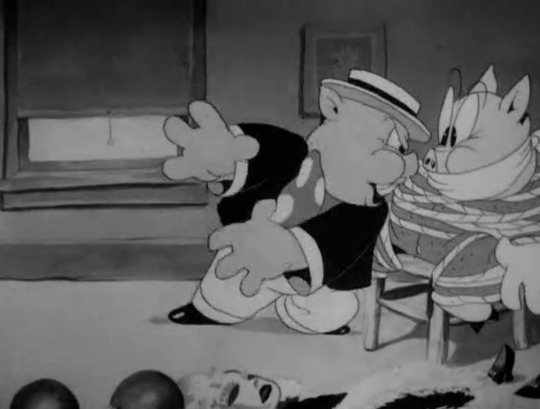
volney white animates killer’s taunts to porky: “and, wit’ your sissy clothes on, i can rob da bank! and YOU’LL take da rap, see!? AHAHAHA!” volney’s animation is fun to watch--before i saw this cartoon for the first time, i only ever saw google images of it, this scene being one of those images. volney’s eye takes amazed me at how anachronistic they seemed, and i remember likening him to joe murray if he made cartoons in 1937. very fun eye takes indeed!
speaking of fun, bob bentley does a neat little scene involving a brawl between killer and his reflection in the mirror. he goes to check out his new pilfered duds (”now i look like da squoit!”), admiring himself in the mirror. suddenly, his reflection grows a life of its own, sticking its tongue out. real killer gets pissed (if you notice, when he does a take of surprise, you can see where the cel of the reflection gets cut off) and punches the mirror, leaving the glass broken, his reflection now touting a blackened eye. while the “reflection becoming sentient” gag may seem tired, i enjoy how interactive killer’s reflection is, all without saying a word. the staging feels incredibly natural and nonchalant.
with that, killer makes his way to the bank, whistling along to the underscore of “with plenty of money and you” beneath the words of the narrator. you can spot a bit of camera trouble as the camera pans out from the sign at porky’s desk reading “PORKY PIG -- OUT TO LUNCH”: the pan janky, the picture briefly turning blurry before resuming to normalcy. it’s more interesting than detrimental, especially considering warner bros never did retakes.
cue a montage of “porky” stowing away the goods of the townspeople into his pocket, pretending to deposit them in the bank. the minor key rendition of “puddin’ head jones” is a nice reminder of killer’s similarities and differences. similar in appearance, maybe, but not much else.
petunia engages in her routine from before, attempting to seduce “porky”. mel blanc’s genius shines as killer responds to petunia’s calls in a gruff, scratchy “YEAH, WHAT IS IT!?” he catches himself, and responds in an authentic porky voice “ye-ye-ye-yes, wuh-weh-wuh-weh-what is it?” the transition is seamless. whether it was on one take or two separate recordings, i don’t know, but it remains just as entertaining either way. i especially like how killer switches from “yeah” to “yes”--porky’s personality, while still relatively thin at this point, is certainly coming clearer. at the very least, frank tashlin knows that porky wouldn’t respond by saying “yeah”. it’s a little detail, but it says a lot.
and, just like myself, petunia also understands the distinctions between killer and porky--especially when killer plants a kiss on her as soon as she pulls the same “how ‘bout you and i stepping out tonight, big boy?” routine. killer grabs her in his arms, sneering “why wait until tonight, baby?” and gives her a kiss, prompting petunia to smack him and declare “why, you’re not porky pig!” killer’s response is full of careful wit and thoughtfulness as he so eloquently answers: “SO WHAT?”
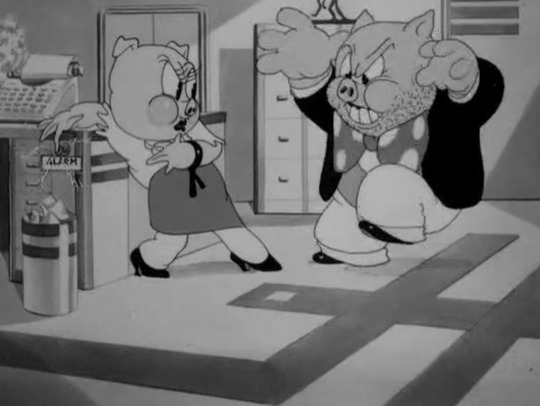
ringing the burglar alarm, that’s what. petunia discreetly sets the alarms off, prompting a flurry of bullets to whiz at killer offscreen (they sure have good security!). killer retaliates with his own shotguns, but quickly speeds off to his hideout, goods still in his possession.
killer and his lackeys admire the treasures stacked on the table, eager to pounce. a clever pan to porky, still writhing around in his ropes as killer sneers “AND DEY ‘TINK YOU DID IT!”
tashlin’s artistry strikes again as we peer at the hideout through the bars of iron gates outside. truck out to reveal police officers crowding around outside, crouching on the ground to remain discreet. the shot is composed rather nicely, with the ground level nearing the horizon line, elevating the subjects to the middle plane. even though the shot itself doesn’t linger very long, the clarity is easy to see. a tree placed off to the side cleverly frames the two officers who are on the screen--little things like that make a big difference.
one of the lackeys notices the cops are lurking by, alerts the others, and immediately shoots his machine gun out the window. watch all of the stuff flying out of his pocket as he shoots--playing cards, knives, guns, jewelry, even a wig! definitely a fun scene to freeze frame and pick apart all the details.
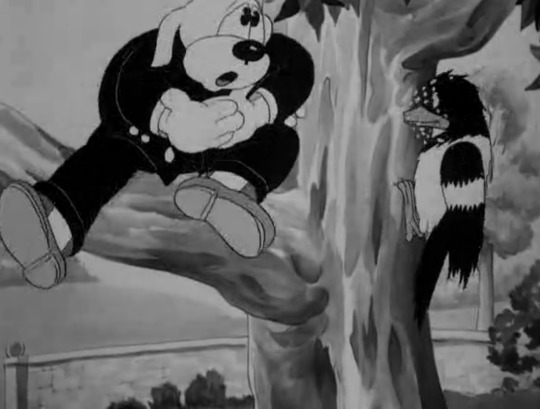
the cops retaliate, and an all-out shootout occurs. a gag reused from i’m a big shot now (another gangster parody cartoon) and porky’s duck hunt ensues as a cop shoots up at the building, the impact from his rifle driving him into the ground as each shot digs the hole deeper and deeper. another rather fun gag includes a woodpecker drilling into a tree, causing the officer in the branch to clutch his heart and moan “they got me!”
in the process, stray bullets from down below shoot out of the floor, conveniently ripping the ropes bounding porky to the chair. a quick bird’s eye view of the hideout, and it’s onto porky to take action. because we all remember porky as a suave, charismatic crime fighter, it’s only natural for him to jump onto a chandelier hanging from the hallway and knock all of killer’s cronies into a door. (do cartoon characters have stunt doubles? surely they do! don’t they?)
volney white’s animation prevails for the remainder of the cartoon. porky hops down from the upstairs landing, plopping down right on top of killer himself. both come to fisticuffs, volney’s hilarious facial expressions and treg brown’s masterful sound effects combining to make quite the amusing amalgamation. certainly a scene worthy of freeze-framing for all of the funny faces!
perhaps even more amusing, however, is the drastic tone shift as soon as the cops arrive: no time is wasted during the transition between the fight and an armed cop probing “alright, who’s the killer!?” the fight breaks up in an instant off screen, and porky (his voice un-sped) pleading “i’m uh-puh-peh-puh-peh-porky!” the transition is almost too swift, but is comical over everything else, so i’m not too slighted by it. killer insists in his own gruff voice “I’M porky!”
the cop isn’t convinced, and tries again. both insist that they’re porky. that’s when it’s petunia to the rescue, who assures the cop that she knows how to find out. she cozies up to the real porky, once more enacting their “big boy” charade from earlier. as porky flops over his words in all of his collar-tugging glory, petunia gloats “that’s porky.” porky nodding along to her affirmation is a nice, subtle touch.
as we’ve repeatedly discovered, frank tashlin was no fan of porky. even though he outwardly admits that he didn’t like to work with him, there are multiple clues throughout his pictures solidifying his disdain. here is no exception, as petunia outright screws porky over.
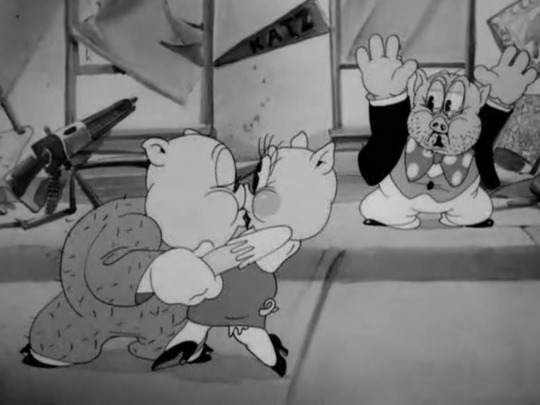
her sultry demeanor changes from reassuring to duplicitous as she heaves a sigh and coos “how that killer can kiss!” porky rightfully grows angry, and, in a pattern we’ll observe in many a cartoon, allows his jealousy to triumph his bashful, reserved nature as he grabs petunia’s arms and pulls her in for a kiss. killer’s eye-boggling, affronted expression and porky’s triumphant, chest-puffing stance after the fact are both hilarious. volney white does a wonderful job of conveying personality through his animation.
here’s the kicker. despite getting her kiss from porky, she still isn’t satisfied. she coldly remarks “i STILL take the killer!” with that, porky can only gawk in awe as petunia and killer march arm-in-arm out the door, petunia cooing that she’ll wait until killer gets out of prison. iris out.
the voice acting steals the show in this cartoon. mel KILLS it (no pun intended) as killer, from the falsetto to the porky impersonation--which is just mel doing his regular porky voice--to killer’s evil belly laughs. sara berner does a fine job as petunia, and tedd pierce’s narration is always a joy to hear. i’m unsure of who voices the lackeys, as they don’t quite sound like mel, but nevertheless, they too are fun to listen to, especially their introductory dialogue. if anything, you should check out this short for the voice work alone.
frank tashlin’s eye for cinematography sparkles as it always does. the opening montage is particularly impressive, especially the use of silhouettes. very bold and striking. his layouts are very well structured, and the cartoon flows very nicely. it’s a snappy one, but it hardly feels like it drags. there’s a lot packed into these 7 minutes!
though i do pity porky, especially at the end, i will concede that the end IS a good shocker, even if petunia is straight up cruel. porky’s personality is slowly weeding its way out of the woods, with some traits (good natured, gullible) sticking to his character all throughout his career. progress is being made! and, as i said before, as much as i enjoy the fat porky design, i won’t shed too many tears over this being its final appearance, because it marks a new step forward for warner bros. cartoons are becoming funnier, snappier, wittier, the disney influence continually waning. good things await.
i definitely recommend you check this one out. while it’s not my all time favorite tashlin cartoon, there’s a lot to admire, from voice direction to animation to even the layouts.
link!
28 notes
·
View notes
Text
Geekerella

Synopsis:
Cinderella goes to the con in this fandom-fueled twist on the classic fairy tale romance—now in paperback, with a special Starfield bonus scene!
Part romance, part love letter to nerd culture, and all totally adorbs, Geekerella is a fairy tale for anyone who believes in the magic of fandom. Geek girl Elle Wittimer lives and breathes Starfield, the classic sci-fi series she grew up watching with her late father. So when she sees a cosplay contest for a new Starfield movie, she has to enter. The prize? An invitation to the ExcelsiCon Cosplay Ball, and a meet-and-greet with the actor slated to play Federation Prince Carmindor in the reboot. With savings from her gig at the Magic Pumpkin food truck (and her dad’s old costume), Elle’s determined to win…unless her stepsisters get there first.
Teen actor Darien Freeman used to live for cons—before he was famous. Now they’re nothing but autographs and awkward meet-and-greets. Playing Carmindor is all he’s ever wanted, but the Starfield fandom has written him off as just another dumb heartthrob. As ExcelsiCon draws near, Darien feels more and more like a fake—until he meets a girl who shows him otherwise.
Title: Geekerella
Series: Once Upon A Con
Author: Ashley Poston
ISBN: 1594749477 (ISBN13: 9781683690436)
Pages: 336 pages (Paperback)
Published: May 15th 2018 by Quirk Books (first published April 4th 2017)
Characters: Catherine (Once Upon a Con), Chloe, Calliope Wittimer, Gail Morgan O'Sullivan, Sage Graven, Darien Freeman, Danielle "Elle" Wittimer
Setting: Charleston, South Carolina (United States). Atlanta, Georgia (United States)
Genre: Young Adult, Contemporary, Romance, Retellings
When I saw that Ashley Poston’s Geekerella was being marketed categorically as “romance,” I got nervous. However, I don’t remember that last time I was so pleasantly surprised by a young adult book — of any genre! I laughed! I cried! I loved!
From start, Poston’s latest is entertaining, heart-felt, and good fun. Geekerella is a stellar combination of Rainbow Rowell’s Fangirl and the 2004 Cinderella Story film (but this time without the hassle of flip phones). Told from the points of view of Starfield-fan girl Elle and Starfield-lead actor Darien Freeman, the narrative leads us through both characters’ emotions, misgivings, experiences, and trials. While Elle’s introduction of Darien — teen soap opera star until his latest gig — is scathing, judgmental, and minimalist, our glimpse into Darien’s world shows strained relationships, terrifyingly overzealous fans, and constant low self-esteem. Elle’s point of view, on the other hand, portrays a young woman between a rock and a hard place (not yet 18-years-old, she can’t leave her stepmother) whose love for and faith in a TV show both inspires her and is very recognizable for other fangirl readers. Plus, she has the best comebacks and makes jokes about being short, and I loved her for all of it.
Geekerella also constructs a sharp-eyed but refreshing modern rendition (reboot, even, if you will) of the classic fairy tale “Cinderella.” In our world, Poston posits, how would a “wicked stepmother” act? How would Cinderella respond? While it has been touched on previously, especially following Kenneth Branagh’s 2015 live-action Cinderella, this version of the story highlights the aspects of verbal and emotional abuse to which the archetypal character is subjected by her only remaining family. In Elle’s case, her stepmother isolates her, blames her, and ridicules her every decision. In the face of this, however, Elle perseveres with the help of Starfield and her own determination to leave when she turns 18. Since this is my favorite fairy tale — the Disney 1950 attempt notwithstanding — Poston’s take was clever, revealing, refreshing, and uplifting in its refusal to look away from these pertinent overtones in the original tale.
Similarly, Geekerella brings the phenomenon of fandom to brilliant life. As a relatively closeted fangirl, Poston’s characters and story made me want to make my geek flag fly a little higher. First, both Elle and Darien are never-ending fonts of nerdy references, trivia, and sayings; all of the above had me laughing out loud several times. Second, in this story, I found, for the first time, all the reasons I tend to gravitate toward fan fiction: It’s a retelling of a favorite story. It follows a budding relationship with all its cute ups and heart-crushing downs. Its female characters are kickass in so many ways and Darien is adorable and devoted. It features a diverse cast — POC and LGBTQ+ characters stand out — that portrays said identities not as distinct or special or noteworthy, but matter of course and a part of the character rather than shock-value. Lastly, its romance is heartwarming, all-consuming, and, dare I say it, cute. Deviating from typical romance plots, Geekerella is not run by the Fate-like wheel of All-Powerful Angst. Instead, Elle and Darien’s relationship, while it has its pitfalls and fights, epitomizes the “pleasant” and “comforting to read” characteristics of what fangirls and boys refer to as “fluff,” complete with lots of adorably “shameless flirting” (like, Darien is so bad at flirting he’s good wow). This genre form of fan fiction is, as mentioned above, often a comfort read, bordering on cathartic, as Geekerella was for me. (Yes, my skin has cleared; my crops are flourishing; and I’m ready to defeat evil aliens and wicked stepmothers, at the same time if need be.)
A story of devotion to and confidence in love, memories, stories, and ourselves, Geekerella revamps the typical “Cinderella” story with fangirling, texting, and selling vegan chimichangas. Poston’s latest young adult book gives insight into self-confidence and self-love for readers of every gender and sexuality. With adorable characters you want to carry around in your pocket and a unique level of diverse representation, Geekerella is a must-read for book, movie, and TV show geeks alike. A final endorsement: This book made my laugh and cry and flail and make ridiculous noises resembling overwhelmed squeaks. I could not put Poston’s Geekerella down!
3 notes
·
View notes
Text
In your first blog post of the semester, explore the tug of war in cinema between the “classical” in cinematic storytelling and those who try to subvert it. Drawing upon examples from the films we have studied thus far, define what “classical” cinematic storytelling is and demonstrate how it functioned in an earlier period of film history, as well as its continuing legacy. Where do you see evidence of the “classical” today? Then, consider how filmmakers working in subversive modes challenge the dominance of classicism, either through subtle, indirect means or by full-on assaults. What kinds of classical storytelling approaches do they reject? How do they do that? What changes in form and content defy the classical? The films we’ve seen will help, as will the various sources you’ve been given for study. Use examples from the films we have studied, and draw upon others that you think are relevant.
Cinema is often thought to be the highest form of art, since it combines storytelling, acting, and music all in one glorious attempt to do something that feels simple, but as we find in exploring the history of film, not so much: the art of telling a story. There are many different ways to approach conveying information in a visual manner, and although the direct method might seem to be the easiest, we find that directors can get away with telling their story in the most imaginative ways possible. From the use of flashbacks, forwards and sometimes even sideways, the viewer is taken on a journey through which they are given the clues needed to piece the entire story together on their own. Directors use these various methods of storytelling often to drive home a point, possibly about how the main protagonist sees the world, or how memories are often skewed through the lenses of either emotion or possible mental illness. Telling a story on screen involves a lot of elements that were cemented as ‘classical’ during the early days of Hollywood, and many directors still utilize these storytelling techniques to this day. Others have forged their own path in defying the classical model of film, whether by altering how the progression of the story is conveyed to the viewers, or simply casting away the norms all together.
As Hollywood began to come into its own in the early 1900′s, many of the silent films that were made followed a recipe for getting its message across to the audience watching the screen. It all started off with Alice Ida Antoinette Guy-Blaché, credited with creating the first directed narrative. Up until that point, most movies that were being made were what we would call by today’s standards ‘b-roll footage’. Images of trains coming into a station, workers leaving factories for the day, and horses running were what was most often seen in early day Nickelodeon’s. Alice was the first to use a three stage story arc when she directed her first short film Suspense. Illustrating the rising action with the mother seeing the robber in the alley below her bedroom window, the climax of the husband bringing the police home with him in time to save his wife and child, and the resolution when the family is safely reunited, and the would-be robber is taken away by the policeman. Using film to not only illustrate a story but take the audience on a journey that tugs at their emotions and leaves them sitting on the edge of their seat was not something that had been done before.

Alice paved the foundation for classical storytelling in early cinema, which was firmly linear for several decades once the Motion Picture Production Code began being firmly enforced by the Catholic Church. Since villainy was to be punished and goodness was to be rewarded in the rules, many of the films that came out between 1934 and 1965 followed the same formula. The man ended up with the woman he was in love with, and they were able to get through whatever troubles sprung up in their way throughout the movie.
We see this in Ninotchka, where a Soviet agent is tempted by the love of a Frenchman named Leon and driven to betray the Communist regime of her country in order to pursue it. Nothing can come between them, not even when she returns to Russia and Leon is barred from visiting her. Even when his romantic letters to her are censored by the Communists, the hope in the story is not completely lost.
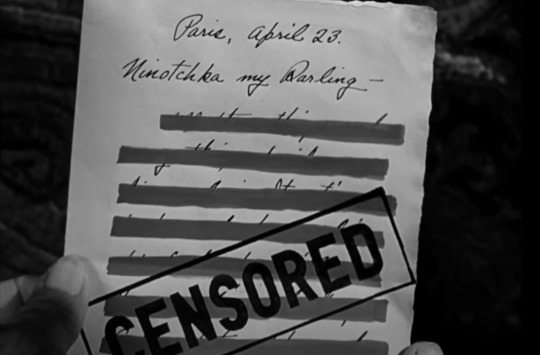
Through all obstacles, Ninotchka and Leon are happily in each other’s arms by the end of the movie. You would think that the Communist regime of 1930’s Russia would easily get in the way of two lovers, but in the glittering bauble of Hollywood, there was seemingly nothing that could prevent the linear storytelling model from rewarding the deeds of the good-doers. Not even a strong-willed, stony Communist woman can ignore the temptation of the love of a man, or the freedom that would come with fleeing her home land. Betraying their home country in the name of love isn’t something many people have to struggle with. Yet we see Ninotchka’s transformation unfold on screen in an almost eerie fashion, under Leon’s influence. At the same time, she doesn’t lose the core of who she is even after falling in love. We see this when she gets quite drunk while out with Leon, and she’s caught promoting Marxist ideals inside the women’s bathroom. At the end of the day, Leon still loves Ninotchka for who she is, Communist and all.
However, some modern films still manage to follow a linear manner of storytelling, even if they are groundbreaking via other means. Take Donnie Darko for instance. Filled with strange imagery that represents Donnie’s visions of how to save the tangent universe from certain destruction, it can feel like a film that displaces the viewer. However, if you have watched it a few times, you can see that the strange, obscure events in the story are still told in the order as they happen. From the night that Frank appears to Donnie and warns him of the world’s impending doom that is to come in twenty-eight days, a countdown begins from that point onward. Even when Donnie is experiencing visions of his school flooded with water, or being egged on by Frank to burn down the house of a local celebrity, we see each day pass by in order until the film’s ending. Images of water and fire are placed against Donnie’s relatively normal, everyday life as a high school boy in a stark, brilliantly vivid contrast.

While Richard Kelly could have chosen to present the film’s events out of order or utilize flash backs and forwards to communicate his vision, his unique and bizarre story was easier to understand since it was told linearly. Kelly still manages to subvert the norm by creating his own science behind what was happening to Donnie, between the tangent universe, living receiver and the manipulated dead and living. Kelly also did not feel the need to show the audience every last little detail of Donnie’s abilities and experiences, feeling that ‘less was more’ in his interview in The Donnie Darko Book. Rather than showing Donnie levitating off of the ground and swinging the axe into the bronze statue of the school’s mascot, Kelly instead cuts to the scene where the disfigured piece of art is discovered by both the police and the principal.

Choosing to let the audience use their own imaginations to fill in the blanks allows the viewer to come up with their own creative ideas as to how events unfold, instead of being spoon fed them shot by shot. A cult classic, Donnie Darko still comes to mind all these years later whenever the topic of films that challenge the classical model through indirect and still wildly creative means.
Then there are directors which completely subvert the linear story model, turning it on its head and taking the audience through an unexpected, wild ride where they are never quite sure if they can trust what they are seeing on screen. Robert Eggers’ newest film The Lighthouse is a story that is difficult to grasp on the first viewing. Even in just aesthetic terms, Eggers goes against the norm in choosing the 4x3 aspect ratio for his movie, instead of the traditional widescreen. It brings us closer to the actors and their rapid descent into madness, giving off a sense of claustrophobia as the dread slowly builds on screen. The movie is shot in black and white instead of contemporary color film, which leads to our eyes having fewer things to be distracted by as we watch. It also adds to the otherworldly, nightmarish atmosphere of the movie, and gives the director more opportunities to use the lighting on set to convey the deeper messages that are found in The Lighthouse.
Eggers has a way of giving the viewer a creeping sense of foreboding without showing anything scary at all. The opening shot of The Lighthouse begins with a large ship cutting through dark and stormy waters, and then we see our two main characters shot from behind with the lighthouse towering above their heads, accompanied by tense music. There’s something to be feared in these beginning moments, even if the viewer can’t quite put their finger on just what it is yet.
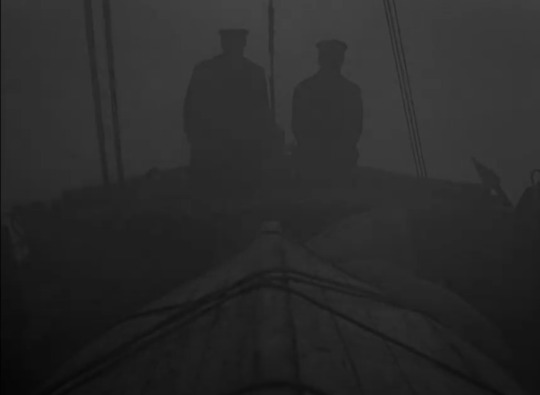
The audience is not sure if the main protagonist, Winslow, is a reliable character or not. There comes a point in the movie where everything we are led to believe up to that point is turned onto its head, and from that moment forward the viewer can not tell if Winslow is of sound mind or not.
The night before their shift is supposed to end and the ferry will come to take them away from the lighthouse and the island, Winslow finally breaks his sobriety and he gets quite drunk with Wake. During what we think is the next day (any attention paid to how much time has passed feeling scrambled by this point), Wake informs Winslow that the rot has gotten to their salted fish. Winslow replies that they had only missed the ferry by a day, and there is no need to ration their food. Wake replies that it had been weeks since they had missed the ferry that was supposed to take them home, not a single day. Wake also says that he had been telling Winslow to ration their food for the past few weeks, to which Winslow does not believe him. Wake comments that he does not want to be stuck at his post with a lunatic, and bids Winslow to go with him to dig up their extra rations, which turn out to be comprised of nothing but more alcohol. Wake makes a few slip-ups of his own in recounting his sailor days with Winslow, having two different versions of how he lost his leg, or whether or not he had been married and had a family. Between Wake’s lying and Winslow’s seemingly unstable mental state, there is no reliable narrator to trust throughout the film.
From then onward, the film spirals into such madness that the viewer can only hope to retain their wits enough to follow what is unfolding on the screen and attempt to piece together what is real and what is not in their own mind. We no longer have any baseline for reality to cling to at this point, between the excessive drinking on screen, and the characters’ untrustworthy narrations. Eggers gives us only the briefest, pin-prick sized moments of normalcy, such as Wake and Winslow catching lobsters for their dinner, or Winslow attending to his various duties on the small outcrop of land that the lighthouse sits on. Even then it is difficult to pay close attention to these tiny seconds of peace after having been put through a dizzying whirlwind of stimulus only seconds prior, with visions of sirens washed up on the beach, or tentacles belonging to some great, terrible beast sliding across the top floor of the lighthouse.


The linear model of storytelling that was cemented in early Hollywood is classical for good reason. The early directors and screenwriters of that era paved the foundation that modern day films still utilize nearly a hundred years later, setting a standard that directors can either utilize, or subvert entirely. It is safe to say that there is no limit on creativity and ingenuity, no matter how the director may choose to tell their story on screen. Whether they follow the classical model, subvert it entirely or land in some sort of middle ground, we as the audience are given plenty of artistic content to work with and ponder about regardless of what they choose.
6 notes
·
View notes
Text
Sweet Treats
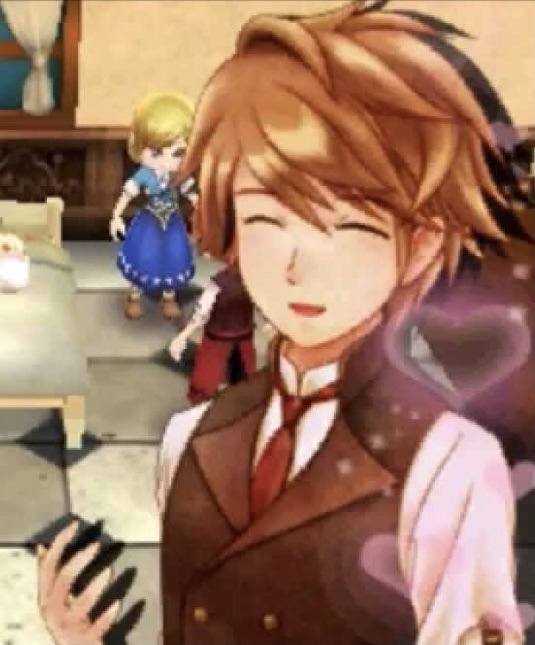
Author’s Note: okay so any writing in ‘these’ is thoughts that the character is thinking it is also been put in a different style so you know and thanks for reading.
Origin: story of seasons (3ds game)
Word count: 1,909
Pairing: Raeger x FReader
Warnings: none really just the harsh conditions that come back from reading my writing.
Summary: (y/n) decided to make Raeger a treat on the anniversary of the time they became friends.

~(y/n) POV~
I took myself out of my bed going over to my calendar, identifying the date as the seventh of summer, recognising it’s an anniversary of mine that I hold dear to my heart, nodding to myself. I wandered over to my closet looking through each of the outfits that I own, discovering the blue and white dress I own what I had Picked out last night to wear for this day.
Taking the hangar out of the closet, I scurry to my bathroom to change out of my nightwear and into the bluebell dress. I set my dirty clothes in the hamper before i exit the bathroom once I’m into the wide area of my house I travel to my full-length mirror to style my (h/l) (h/c) hair.
Turning to face my kitchen, I raise my left hand onto the counter as I reach up to the cupboard on the wall to get down my recipe book with my right hand. Holding it in both my palms, I set the bulky book on the counter. Smiling as I scanned the cover “(Y/n)’s book of deserts by Raeger” flipping the pages scanning each open till I pause on page 29 seeing a small design of a pinkish-red pie with a golden pastry topped with pale green rosettes of cream circling the rim of the pastry.
“That’s the one” I murmur to myself as I learn the ingredients nodding to myself as I placed my apron on as I pick up the equipment that I needed placing them on the counter. Turning my head to the fridge I stride up to it gripping the door before opening it scanning the contents of the fridge spotting the watermelon, watermelon juice, kiwi, double cream, condensed milk, lard and margarine taking each of them out of the fridge and setting them onto the counter I move to the cupboard taking out flour placing it beside the other ingredients.
I glance to the clock before I choose the 4-inch pie dish since I was simply making it for one person moving to the side while I prepare the pastry humming a light tune that ends just as I finish preparing the pastry which I then roll up and cling film and set in the fridge to rest.
Grabbing the condensed milk, watermelon, watermelon juice, and cream, I commence on the filling of the pie crust, forming a watermelon cheesecake mix without the cheese. I stare at the bowl with the batter in uttering a little “very pale” opening a draw beside me stumbling through the things before I pull up natural red food colouring.
Opening the vial up I drop a singular drop into the mix before stirring it to catch the colour get sharper as it wound up a colour akin to that of what a watermelon on the inside looks like moving it to the side to take the pastry out of the fridge to assemble the crust before baking it looking at the complete pie components I realise I’m missing an essential part of the pie quickly whipping up the kiwi flavoured cream I check on the time and look in the oven at the pastry taking it out with oven gloves as the pastry turned a golden colour.
After assembling the pie, I set it in a small white box before noticing two hours had occurred; I put the box in the fridge and rush out of my home to take care of to my animals and field. Walking to my field, I take my watering can and sprinkle the strawberries, speaking to them as I say small encouraging comments to the plants.
“That’s it become big my strawberries you will be the tastiest in town” once I finish watering the plants I waddle over to my chicken hut to look after them arranging the grain into the trough I continue to check on the cows spotting my favourite one Cherry a reddish-brown cow running up to her I pat her head as she happily moos.
“Cherry darling guess what day it is” cherry moo’s as if she can understand me “yes that’s right I will travel straight thereafter I have looked after you all” Cherry lets out another moo as she gradually turns away so I could look after them. Placing water in the water trough, I wipe my forehead a little with my forearm and wander out of the cow shed and back into my home to read the time.
Taking a big inhale of air at what the time is now “oh sheesh it took four hours to cover that” mumbling to myself I glance at myself in the mirror before fixing my attire and picking up the box from the fridge in my hands flying out of my house.
Arriving at the entrance of the central part of town, I search around before I rush to the only restaurant in the centre. Looking at the door I spot a closed sign on the door knocking at it lightly I wait before the door gently opens to a dirty blonde haired male in a chef outfit smiling.
“Ah (y/n) what do I owe the pleasure of your arrival at my shop on this day” tilting my head to the side as a cheeky smile appears upon my face as my eyes narrow.
“What can’t your friend come over for an impromptu visit” he shakes his head, chuckling a moment before opening the door further, stepping to the side with his arm out pointing inside. Walking past him into his restaurant, I look to the island bar moving up to it, setting the box on the counter and hopping onto the seat.
Raeger closed the door, striding over to where I was sitting spotting the box that I had set “oh pray tell what you have brought over” I stare astonished at him, my mouth settling into an o shape.
“I-well-um, did you forget today is the anniversary of when we became friends two years ago” a shocked look sprung onto his face before it transformed into a sad one.
“Oh, it is I’m sorry I have got nothing for you I’ve been rather busy” I shake my hand about, laughing softly as I open the box, removing the small pie.
“That’s okay I brought you something that I made. Do you have vanilla ice cream” his face lights up at the sight of the pie then nods running off to the freezer to bring the ice cream as I pick up a plate and set the pie on it out of the tin.
“Here I go it” you spot him rushing back as his words spill out as I take the ice cream out of his hands my fingertips grazing his as I drag it back to scoop up ice cream and plant it in the middle of the pie.
“There ya go it’s a watermelon pie with kiwi cream and vanilla ice cream its to cool you down in this hot summer heat.” he glances up to me with a modest flush to his face before peeking at the pie gasping.
“You used the recipe book I made you” he has a small taste of the pie before staring at me again, stunned. “this is a cheesecake filling,” I hum a little in agreement.
“Yup, I didn’t like how it was gelatine so I produced a cheesecake filling without cheese so it could bring the flavour out better.” he studies the pie before eating more of it humming.
“I guess I know what I could make you do you mind waiting” he stops eating the pie taking the plate with him and placing it in the sink “you’re wonderful at baking you realise that (y/n)” I giggle at his compliment and settle my head against my hand.
“I learnt from the best. Isn’t that right Raeger” winking at him he spins his face away as he hesitates over a few words as he’s creating something “y-yes you di-did I recall when you first asked me to teach you to how to cook you had the same dress on and your hair was longer than it is back then”.
“Do you recall everything back then?” I interrogate him as he puts something in the oven before he twists his entire body to me.
“of course I recall everything it was the fifth time we had met when you requested that. You even suggested we could practice at your home since you realised I don’t like people who aren’t dear to me in my kitchen.” He draws a deep breath before he proceeded, “it’s also the first time I stayed an outfit I genuinely loved but solely on that peculiar person”.
My head tilts to the side as a wrack my brain, struggling to recall who we passed by when traveling to my house, before removing my head from my hand, hitting my fist into my open palm.
“Oh, Angela yeah she was sporting a nice dress that day I didn’t realise you liked her.” he peered at me with a sad expression before exhaling.
“That’s not wh” the timer on the oven had sounded out as he opens the oven to take the creation out as he gradually assembled what he was creating “close your eyes please (y/n)”.
“Oki” I close my eyes as I feel Raeger's presence in front of me before a small cold item was situated against my lips. “Open up please,” a murmur comes from him as I open my mouth slightly as he sets the treat in my mouth as his fingers rest against my lips as their warmth spread over my lips.
“Soft” I open my eyes hearing the murmur of words said but not following them while I savour the taste of the treat in my mouth “huh what did you say” he sways his head, bringing his hand away.
“Nothing, nothing, just savour the gifts” nodding I pop another in my mouth to devour it, beaming as he just watches me.
“They’re amazing you realise that are these a new item on the menu I bet many individuals have loved them the milk chocolate goes nicely with the watermelon gelatine and the kiwi flavoured chocolate goes nicely with the vanilla shortcake,” he looks at me shocked before his face comes back to natural.
“I just came up with them you gave me the thought and no they won’t go on the menu and I’m truly shocked you could taste every flavour,” he looks at the plate of chocolates then back up to me placing his palm on the side of my face rubbing his thumb against my plush cheek “your so wonderful (y/n)”.
~Raeger POV~
‘She’s so beautiful I love how the dress she’s wearing is what drove me to notice her. I love how she asked me to teach her how to cook and I love how every new recipe I create is because I dreamed of her. She is my friend and my first love and I can’t wait to express to her how much I cherish her’.
“No, you are my favourite chef you are incredible” she beams up at me as my palm stands on her soft cheek.
‘She will be the death of me one day’.
#raeger sos#Raeger#sos#story of seasons#fanfic#fanfiction#xreader#xfemalereader#Raegerxreader#character x reader#Raeger x reader#most probably be a pt2
6 notes
·
View notes
Text
READING GUIDE TO : Bourdieu, P. and Passeron, J.C. (1979) The Inheritors: French students and their relation to culture, Chicago: University of Chicago Press. - Dave Harris
Chapter one
Class chance data is presented for France, covering access to university and also choice of subjects. Generally, Arts and Sciences are preferred for lower class applicants, while the other professions attract upper class students. Gender is magnified by class in terms of access, especially for lower class students, and a strong influence on subject choice throughout. However, some Arts students are also relegated from the upper class: for them, arts subjects are a refuge.
There are therefore economic and cultural obstacles to success at the university. These include religion and age [in France, the older students are often those who have had to repeat grades].
Social origins produce different rates of financial provision, affect where people live, and affect the sort of work they do. For example, they influence the amount of parental subsidy.
As a result, students do not really have a common situation or experience. They come from very different cultural backgrounds, and quite different experiences from being at home or feeling out of place (13). They experience differential success according to their 'previously acquired intellectual tools, cultural habits' (14). Particularly important is their ability to manipulate 'the abstract language of ideas', which is much easier if you have done Greek or Latin. Cultural heritage is also amplified by various scholastic streams and channels, which produce 'sanctions which consecrate social inequalities' (14). For some, their educational past is a definite handicap, including the absence of classical languages or adequate advice on careers.
These inequalities are concealed by their belief that some students possess 'gifts', producing a disdain for practical techniques of study noted below. University life tends to be eclectic and dilettante, mostly because bourgeois students are 'more assured of their vocations or their abilities' (15). Those from other origins are far more dependent on the university. For the bourgeois, a liking for 'intellectual exoticism and formalistic purity' helps 'liquidate a bourgeois experience while expressing it' (15). Detachment and a willingness to take risks 'presupposes a greater security’ (15). Self assurance pays off in exams, especially in orals [presentations?]. This stance is helped by universities themselves who value 'remaining aloof from "academic" values and disciplines' (17).
Bourgeois students inherit 'habits, skills and attitudes… knowledge and know how, tastes and a "good taste"'(17), which do pay off even if indirectly. A suitable extracurricular culture is the 'implicit condition for academic success in certain disciplines'(17), for example coming from a family with experiences in the theatre, art galleries, concerts, knowledge of modern works even jazz or the cinema. These experiences display a combination of cultural and economic factors here [and strongly prefigures the work in Distinction, even with some initial survey data]. The absence of explicit instruction in universities makes this cultural influence more important. Influences are often subtle, for example in the displaying of knowledge of the past in the effortless reproduction of academic argument. Interests are often combined, enabling those from suitable backgrounds to distinguish themselves from those possessing purely scholastic knowledge. There is a whole constellation of knowledge to draw upon. There also important personal qualities such as 'ironic casualness, mannered elegance, or… assurance which lends ease or the affectation of ease' (20). [So common among the English upper classes as well].
This sort of cultural background works indirectly, casually and informally, it seems effortless, acquired by osmosis [some nice examples on page 20—like the casual disclosure of cultural interests, 'acquired without intention or effort']. Those from lower and middle class backgrounds try to catch up at university, for examples by going to film clubs. Schools could compensate, but they also tend to ignore social inequalities and devalue 'the vulgar mark of effort' (21). Thus universities offer only a misleading formal equality, and ignore marked social differences, whole areas which are clearly related to success. Teaching presupposes a level of knowledge, skills and culture which are the 'heritage of the cultivated classes' (21).
Secondary school uses a number of secondary significations which take for granted 'the whole treasury of first degree experiences’—books, entertainment, holidays as 'cultural pilgrimages', and 'allusive conversations' (22). The universal nature of education simply means all must enter. Working-class children can only imitate, and the whole experience for them is unreal.
Access needs to be not just a matter of economic background. 'Ability' should not be seen as a matter of a gift but the result of 'affinities between class cultural habits and the demands of the education system' (22). Knowledge and techniques are inseparable from social values. Some working-class students are willing to undertake university experience because they see academic knowledge as high status, and it 'symbolises entry into the elite' (22). However, social mobility via education is 'a fantasy, and abstraction for [most] manual workers' (23). Their ambitions are lower: they make an objective adjustment. The petty bourgeoisie are the most keen on education, and they openly support elite culture even though they find it just as difficult to acquire: they think they can make up the deficit with hard work.
Teacher judgments are ultimately based on the closeness to elite culture. Teachers classically devalue other approaches such as seriousness and hard work. Social advantages and disadvantages are cumulative as a result. Even geographical location is important because living in a city means greater access to cultural facilities.
There is no mechanical determinism here, though, since inheritance is not always successful. Upper class culture can merely lead to the 'superficial pastime of elegant parlor games' (25), but usually it is exploited to find a comfortable way through an education system. It is true that working-class entrants to university can gain in ambition and determination. However, those who succeed nearly always have some kind of unusual family background like a successful relative, who will raise their ambitions and reject fatalism. [In conventional research as well as in policy and common sense] isolated factors are seen as important [instead of seeing qualifying factors as well].
It is more common to persuade the underprivileged to drop out rather than to exert a direct influence on them, or to reveal open determinism. It would be wrong to attribute all the blame to economic or political factors, but social mechanisms work well despite minor adjustments such as scholarships. Indeed, these minor reforms can help to justify the system by locating 'giftedness’ as the issue. The same goes for moves to equalise the economic circumstances of students [grants?]—they would only legitimise a system which itself legitimises privilege.
Chapter two
There is no unified student world or culture, but a constant flux with only periodic routine. There are cycles of study leading to exams, but it is a unique time of life where normal oppositions do not apply, including the opposition between work and leisure [lots of quotes on page 30 from students saying that they regard their work as a form of leisure:
'It's the only time in life when you can put off what you've got to do, work when it suits you, be unemployed if you feel like it… (Senior executive' son, Paris, aged 26)… There's no such thing as leisure: I refuse to draw a line between work and leisure, I don't accept that dichotomy… (Junior executive son, Paris)… My work isn't unpleasant; it's not something I'm forced to do. I could almost say all my work is in leisure… (A junior executive son, Paris)… I don't separate work and leisure. If there's a decent movie on I go and see it, whether it's a weekday or a Sunday. The question really doesn't arise. There is no particular pattern to my leisure activities; I choose what I'm going to do but I don't organise it… There's nothing fixed (senior executives daughter, Paris)' (30).
However…
'Yes I waste a terrible amount of time; I don't know how to organize my work properly, and, since workhouse to come by for leisure… I have no time left for leisure (senior executives some, Paris). The fact is I don't seem able to discipline myself, it's always the same story (senior executive's son, Paris)'. NB Bourdieu and Passeron see this as an aristocratic form of lifestyle.
There is a characteristic student lifestyle with a lack of discipline and a ‘libertarian use of “free time”’ (31). Students are individualised, despite occasional ‘islands of integration’ (32). Integration has no institutional basis. It is therefore not easy to organise collective work, or cooperation, or small workgroups. Individualistic competition persists instead. The old traditions like student festivals and songs are in decline, and there are not even initiation rituals, except possibly in Law and Medicine. There are no real social divisions or any bases for solidarity—for example the rivalry between different disciplines or other signs of the persistence of sub cultures, including argot. Students are not even well connected through friendship groups, except where these depend on earlier shared schooling or regional identity. Upper class students are the most integrated socially. Friends’ advice is not sought in the choice of a subject or career, rumours spread but not information.
The student milieu is therefore not autonomised, but consists of a ‘fluid aggregate [rather] than an occupational group’ (36).There is a nostalgia for integration, but actual organisation fails. Girls are the keenest to initiate collective activity, following the ‘characteristics of the woman’s traditional role’ (36). Staff participation helps. The most common result of this lack of organisation is resignation or utopianism, especially in Paris students’ activism, which includes ‘conceptual terrorism of verbal demands’ (37). A belief in cooperative work, small groups and so on persists, but as the projection of an ideal.
Yet such projections reveal an underlying objective reality [by contrast]. Students want to identify individually with this mythical unity. Characteristic student behaviours are ‘symbolic’ indicators of this project. 'Student' is therefore a chosen identity, the rejection of past identities, including those associated with the occupation of one’s parents, part of a general denial of class determinism [but not gender?]. It is important to not conform, to distinguish oneself while labelling others. This is another example of the transformation of necessity into freedom (39) [so it is not just the working classes who have to do this?] Student identity means the rejection of any actual bonding. For example cafes are frequented because there, one encounters the ‘archetypal student’ [rather as students went to the library in Lille to conform to the archetypal student, in Academic Discourse].
Students live out their relations to their class of origin according to ‘the models of the intellectual class reinterpreted’ (40). They display a reaction to the discipline of the secondary school. By comparison, student identity is a sign of ‘cultural free will’ (40). Guidance from older students is important here, and prestigious examples can include university teachers. Everyone knows a high prestige professor who is far from being a mere pedagogue. This only disguises power relations.
The university is still a very important influence, though. Students still do well if they are ‘adapted to the university and can transpose its scholastic techniques and interests’ (41). So called alternative cultural worlds, based around jazz or cinema actually complement the university world [is this still the same with contemporary universities and contemporary commercial popular culture?]. [There is a hint of the cultural omnivore thesis here, 41]. Students’ public denial of the importance of university culture and teaching disguises the real influence at work through the ‘cultural goods market’ (42).
An important role in actually orienting the tastes of students is played by ‘Professorial charisma… The display of virtuosity, the play of laudatory allusions or depreciatory silences’ (42). Students are passive and willing to be taught, or to let teachers guide them. So close is the connection that ‘the study of consumption can be collapsed into a study of production’ (42). University culture includes ‘the scholastic consecration of novelties’ (43). As a result, university culture is more homogenous than it looks [in support, student prize winners are given as examples, revealing their conformist tastes, even if those cover the avant garde]. The ideal student is still a homo academicus, often the son and grandson of teachers, often wanting to be a philosophy lecturer, often showing some precocious talents. The university therefore ‘always preaches to the converted’ (43).
However, some students are only playing at having intellectual tastes, displaying ‘collective bad faith’, or deploying the ‘ruse of reason’ (44). An illusory intellectual life is possible. It usually involves ignoring social origins and destinations, and ‘autonomising the present of studenthood’ (44). It involves games and tricks, and is assisted by the ‘unreality of university practice’ (44), where there are no real sanctions, and even examinations are playful rather than work-like. Students do feel insecure, and lecturers do judge their work, but there is a constant ambivalence—for example students and lecturers commonly joke about examinations and yet still see them as a matter of ‘personal salvation’ (45) especially the dissertation. It is a very involving game. Even the student challenges are within the rules of the intellectual game of contestation: thus ‘Revolts against the system… achieve… the ultimate ends pursued by the university’ (45) [reads pretty much like Willis on working class lads rebelling but then ending up in manual work]. Even student rebels worship culture if not the university. Bohemian behaviour still equates to obedience to traditional models. Any escape into popular culture is still characterised as a form of literary discussion.
This is especially marked in the Paris Arts Faculty. Students are mostly bourgeois, but commonly deny their background and espouse left wing causes, but without adopting any particular orthodoxy or party membership. Instead, they adopt new labels. They have a mostly aesthetic commitment to an avant garde, which leads to a ‘conformism of anti conformism’ (46). Rebellion is little more than the ‘symbolic breaks of adolescence’ seen as an ‘intellectual self realisation’ (46). Any sexual liberation pursued by women can be seen simply as a formal reversal of the value of virginity. Extreme political views are best read as a symbolic break with the family. Symbolic differences are more important than the real differences provided by social origin. Student radical life features endless argument to establish differentiations within the general consensus of the avant garde. Concrete commitments tend to be applauded. Political debate is seen as a kind of play, and is work. Politics becomes a pastime. In reality, it is wealth and privilege that enables intellectual detachment, intellectual mastery, and political audacity. Privileged students are also better able to accumulate a ‘capital of information’, based on their membership of literary and philosophical political coteries, and the ability to attend lots of outside lectures and assemblies [in Paris] (49). Any diversity in the academic world produces the relativisation of professorial privilege [not enough to lead to serious criticism?] , and the opportunity for more intellectual adventure.
University life becomes an excellent preparation for the later literary games played among the Parisian bourgeoisie, and wider philosophical discussion, for example of the crisis in education, shows the ‘beginners’ illusion [masquerading as a] basis for a universal reflection’ (15). There is still a lot of studentanxiety however, and here, ideological debates offer assurance. A liking for student [revolutionary?] festivity is really a form of symbolic integration.
The ideal type Parisian Arts student draws from a literary education and from the cultural opportunities offered by Paris, and the ‘risk free freedom that a well to do social origin makes possible’ (51). Bourgeois students see university life as intellectual adventure, not as ‘an apprenticeship subject to the test of occupational success’ (51).
There are more working-class students now, but bourgeois values persist: those values ‘will not cease to be regarded as inseparable from the [student] milieu’ (51). Nevertheless, modern students can perceive university teaching as somehow unreal, possibly because they have experience of real occupations. Thus actual students will vary according to their commitment to the ideal type, and this will vary according to their social origins. ‘Serious’ students can be both critics of this unreality, and still prepared to consider only university problems as serious.
[What a condemnation of student activists! I do recognise the posturing bourgeois type from my own experiences during the student revolt at LSE, and, later at Essex, and I know exactly what they mean by the insistence on preserving literary forms of argument while discussing radical overhauls. During one sit in at LSE, friends made it their business to guard the library! Proles werestill mocked for their vulgarity. Several dreadful poseurs made fiery speeches proposing solidarity with the north Vietnamese army, and then fled at the prospect of being arrested by the metropolitan police! However, I think they do underestimate the impact on some working class lads such as myself, who did gain an insight into professorial incompetence that led to a lifetime’s scepticism. Nevertheless, I think they are broadly right. Interestingly, the ideal type bourgeois radical manifests itself best in education departments of respectable UK universities, where students are still harangued with idealist and utopian visions, and words like ‘oppression’ or ‘struggle’ are used both to describe third world radical movements and the need to cope with an inconvenient timetable].
Chapter three
[This chapter starts with an astonishing criticism of child centred and play-centred education—by Hegel! Such an education preserves immaturity, it is indifferent to the intellectual world, and it shows contempt for elders! (54)]
It is possible to construct an ideal type of rational conduct for student, based on the claims that characterise university life. However, the real issue is self-creation, and to be a participant in academic culture. The rational type will argue that university culture is to be mastered, yet this is denied in practice, and instead there is a goal of independence, the abolition of the distinction between the student and the teacher. However, this distinction is abolished only in the imagination, without going through the painful process of subjection first [very familiar terminology here!]. Indeed, there is often a straightforward denial of student passivity. This imaginary resolution is satisfactory to students and professors, although denied by both conservatives and revolutionary utopians. Rational conduct, however would involve seeing passivity as a means to an occupational end. The denials involve a view that the present should dominate the future, and that the status of student should become more autonomous.
Students occupy pre- constructed roles, like the 'exam hound' or the dilettante. Life goes on in a magical mode [compare with the notion of magical resolution in gramscian work]. Options can coexist in that world. The magical world is supported by professors, 'the students'opponents and accomplices' (57). Professors do not want to appear as having a rational role, as a mere 'teaching auxiliary' (58). The whole experience is therefore mystified or enchanted, and this mystical relation rather than the technical function of education affects the teaching experience. Professors claim they have some gift in transmitting culture, and this notion of gift is reciprocated by students [very similar arguments are made in Academic Discourse].
Students do vary, however. The awareness of an occupational destinations seems particularly vague for Arts students, and uncertain for sociologists: these views actually mimic the real possibilities! There is no occupational point to study for the students, so it is justified instead as an intellectual adventure. Their values ‘depend on mystified experience' (59). [There is a hint here that the enchantment of rationalised study is deliberate].
Women students have more reason to mystify, although for them reality dawns earlier. They often describe the substantial freedoms involved in using academic work to escape [rather like the stuff I have been quoting from Quinn!]. However, intellectual escape is still associated with the traditional female values, including their desired destinations as teachers, and their lower confidence in their intellectual capacities. They're still more likely to be instrumental, and to use their 'scholastic zeal and docility as a way of avoiding the question of the future' (61). Another option is female student apathy. [Or] female students report high levels of commitment to university life, again echoing traditional female values such as exalting sacrifice, and using words like relationship or enrichment, or talking about the development of personality [lots of examples PP. 61,62]. This can be an alternative to the magical concealment preferred by men. Female options echo the sexism of the university.
Social origin has effects as well. There are parallels between working class origins and being female. Neither are likely to get an intellectual occupation and so they are less likely to invest in the intellectual game approach. They need to bow to necessity and acknowledge the importance of an occupation. Upper class students are happier with vague projects, but working-class students are more focused, because they are more aware that they need not have been students at university at all. Upper class students are more distant, more prone to mystification, more contemptuous of pedagogy and methods, and of scholarly discipline. They, and many professors, would find any kind of practical instruction about coping with university life—like using a card index for drawing up a bibliography—as demeaning, the act of a 'vulgar schoolmaster' (63). The same goes for any kind of intellectual training—instead, upper class students and professors prefer the romantic image of free. inspired creation.
Magical perceptions are common. Professors collude by denying clear information, such as their criteria, and the techniques necessary to succeed. Students deny the importance of hard work and routine, and see success arising from a gift or by magic. This explains their following examination rituals, whether it be feverish last minute revision, or obsessive note taking—'a technique for spiritual consolation' (64) [modern students attend lectures and seminars obsessively, and even complain if they are cancelled—but never take notes!]. There are superstitions, guessing rituals, amulets and fetishes, and the repetition of successful conduct. Success is seen as a reward for having a gift, including the gift of successful guessing (65). There is 'overt contempt’ for any rational approach (65). Professors collude in this too: it is reciprocal—for example the lecture style means that students can enjoy anonymity [and ritual attendance]—and both professors and students oppose rational approaches.
These findings show the ultimate goal of the university system [social reproduction]. The rational approach contradicts these ultimate goals. Cultural transmission could be rationalised, and it would benefit the most disadvantaged students [more on rational teaching later].
Conclusion
Because real educational inequalities are never discussed, differences are seen as a result of ‘giftedness’ (67). Differences are tolerated only if they are seen as differences in gifts, or as the occasional social handicap faced by a gifted student. The lack of talent or enthusiasm in students is never explained. Formal examinations express a purely formal equality: as they are anonymous it is impossible to see how they reflect cultural inequalities. The formal policy of equal opportunity only ‘transforms privilege into merit’ (68). It is impossible to have any other outcome unless serious weight is given to the social origins of students [or value added?]. However, we would then expect unequal terminal performances. This could lead to a hierarchy of institutions, and the degree overall could be devalued. Experience in some communist countries might be cited, but even there there is often a tension [between rewarding 'redness' and expertise]. Overall, the roles of the game have to remain unquestioned. The lack of questioning is shown in the continuing attraction of the grandest institutions and most prestigious disciplines in French universities to all recruits. The credibility of the system requires that inequalities affecting students from outside the university are ignored. Insisting on the role of social differences is therefore a challenge to the whole system.
Giftedness is like charisma. It benefits the privileged and legitimates their contempt for the less privileged. Working-class students accept this as a kind of essentialism (70), and personalise their disadvantage. Indeed, working-class students are among those who believe most strongly in the idea of a charismatic gift. The tendency to reduce to essentialism is common among students because they are already prone to see who they are as what they do.
Teachers also assume their success arises from some personal gift, another essentialism. Often, the education system has been their only route to success, confirming this essentialism. It is often linked with the denigration of vulgar effort.
Students are only too willing to accept their status as victims rather than blame ‘clumsy teachers’ (71). Often their parents are over impressed by teachers' opinions or by the simple scores in educational tests, and are liable to say things like ‘He’s no good at French’, which naturalises inequality. Student objections to the system are often still couched in [victim vocabulary], and they expect solutions to be provided only by the generosity of teachers. Populist demands [such as that working-class culture has to be valued alongside elite culture] are also limited, since the dominant system is not just a simple class culture. Furthermore, academic skills and aptitudes can be learned.
The first requirement is to aim to affect the home environment. Teachers need to be fully explicit about what is required. The usual formulae are not enough [superstitions, but also including routine study skills advice?]. Teachers need to avoid any claims to have professorial charisma, and to develop a rational pedagogy, although this is ‘still to be invented’ (73). Scientific pedagogy is no good because it ignores social conditions [so a real difference between Bourdieu and the educational technologists here]. We need to evaluate different methods of teaching, modes and actual procedures—for example, should we give general technical advice or close direction of student work? Efficiency should be seen as related to students' social origins. We might need constant exercises to build up the skills needed. At the moment, this is denied by the myth of student autonomy and independent learning (74) which only help legitimates the charismatic teacher myth and see alternatives as pedantry.
Students vacillate between the perceived need for discipline and the myth of the aristocratic stance. Teachers also vacillate, taking an aristocratic stance until they have to do assessment (75). Professional judgments in reality are 'based on personal criteria, variable from teacher to teacher and… tied to the particular case' (75). Students need to decipher these criteria and try to rationalise them.
Students from upper class origins can adapt to these diffuse requirements, because of a 'clear affinity between school culture and the culture of the cultivated class' (75). When asked to undertake oral exams, upper class students just demonstrate the skills which are already unconsciously valued [in presentations too?]. Any open recognition of the effects of social origin 'would be regarded as scandalous' (75).
In a rational approach, there would be clarity about the 'reciprocal requirements of teachers and taught… the organisation of study… to enable students from the disadvantaged classes to overcome their disadvantages' (75). [Then a strangely utilitarian remark]: we should permit the 'greatest possible number of individuals to appropriate in the shortest possible time, as completely and perfectly as possible, the greatest number of the abilities which constitute school culture at a given moment' (76). This approach will be neither traditional nor technical/specialist. Until we develop it, education cannot overcome inequality. At the same time, a rational pedagogy is in its turn impossible unless recruitment of teachers and students is democratised.
Epilogue
The middle class demand for university expansion arises from the need to secure their social places [credentialist closure]. The response to the development of a modern economy has been to demand more kinds of education. Diplomas themselves have probably been devalued in terms of their role in regulating access to jobs. The rapid growth of more functional [vocational?] education and more functional jobs have devalued traditional diplomas, and excluded non holders of diplomas altogether. Academic qualifications have also helped to unify the whole system of qualifications [compare with the British government's model of 8 different levels].
As well as obtaining a diploma, it is important to exploit its value, and this requires further investments of educational and social capital. Those stopping at the lower levels, and new arrivals at the higher ones, are likely to suffer most from devaluation. They can fight back, for themselves and for their children, by demanding even more better qualifications [as in the credentialist spiral].
Educational qualifications can be converted to economic capital in several ways. Graduates might be able to demand higher wages: those holding diplomas have overtaken small independent businessmen in terms of income [almost a counterbalance argument here, based on some statistical evidence, the authors claim]. Alternatively, graduates might be able to shift into new businesses. This can be seen in the changes around craft work, for example, which now feature luxury and leisure goods. These require a more cultural capital (80). For such goods, value lies in the 'casual distinction of the vendor [as much] as on the nature and quality of the wares' (81), and it is important to demonstrate a mastery of taste rather than technical skills. These sorts of new cultural industries seem ideal for those with cultural capital rather than high levels of educational capital [as an example, the denser members of the UK royal family seem to be able to make a good living making very posh furniture].
Holders of devalued qualifications can try to retain their value [an interesting possibility relating to the recent work on knowledge economy in the UK, which also predicts falling returns to university degrees]. For example, the diploma can become a licence to gain privilege rather than an actual job, and to increase self esteem. Again more objective mechanisms are required, including a need to invest in valuable educational capital, perhaps by pulling out of unfashionable subjects [or unis]. It is possible to cling on to the old values to some extent, if you can persuade colleagues and the family of the value of your diploma, this can sometimes mask a real devaluation. In some circumstances, it might lead to actual revaluation [if particular degree subjects become fashionable, or if you can persuade employers that the prestige of the qualification is the most important thing]. Those who supply jobs however are likely to reward their real value of diplomas, especially if they are pursuing deskilling strategies as well. [I can still see a place for well educated but non technical people as decorative members of boards of directors]. In the worst case, diploma holders can be unemployed, and can see themselves as refusing to play the game [hence the moral drop out, who gains an engineering degree, finds it overtaken by technical developments, and gives it all up to run a smallholding in Devon].
2 notes
·
View notes
Text
The Voice from the Whirlwind
A homily on Job 38:1-11,
preached at Trinity Cathedral, Pittsburgh,
on the Fourth Sunday after Pentecost 2021
Our Old Testament reading today is taken from the book of Job. Many scholars consider Job to be a literary masterpiece and its poetry the most beautiful in the entire Hebrew Bible. In light of that, I’m going to read our text again from the King James Version, which does better than most any other version at capturing the grandeur of the language.
Then the LORD answered Job out of the whirlwind, and said,
2 Who is this that darkeneth counsel by words without knowledge?
3 Gird up now thy loins like a man; for I will demand of thee, and answer thou me.
4 Where wast thou when I laid the foundations of the earth? declare, if thou hast understanding.
5 Who hath laid the measures thereof, if thou knowest? or who hath stretched the line upon it?
6 Whereupon are the foundations thereof fastened? or who laid the corner stone thereof;
7 When the morning stars sang together, and all the sons of God shouted for joy?
8 Or who shut up the sea with doors, when it brake forth, as if it had issued out of the womb?
9 When I made the cloud the garment thereof, and thick darkness a swaddlingband for it,
10 And brake up for it my decreed place, and set bars and doors,
11 And said, Hitherto shalt thou come, but no further: and here shall thy proud waves be stayed?
This portion of Job comes from the very end of the book. In the thirty-seven long chapters that precede it, we have heard the story and the voice of Job, as well as the rebukes of some friends of his that have come to visit him.
Let’s recall that story so that we have the context for the portion we just heard. Job is a kind of Everyman character, a timeless figure. He does not seem to be descended from Abraham; he is not an Israelite. He is from Uz, some faraway city, and he is described as “the greatest of all the people of the east” (1:3). We might picture a wealthy sheikh with a palace and a retinue. His city and his lifestyle are meant to transport us into a sort of fairy tale setting (and remember — as C. S. Lewis and the Inklings remind us — that doesn’t mean the story is any less true! To be swept up in a good fairy tale is to be forced to grapple with something true about us).
One day, according to the story, an accusing, adversarial angelic figure makes a proposal to God in his heavenly court. He claims that Job only worships God and lives a virtuous life because it’s easy for him to do so. “But stretch out your hand now,” the adversary tells God, “and touch all that he has, and he will curse you to your face.” And God gives the adversary permission to take away Job’s family (his ten children are all killed), his wealth, and his health. And Job’s response is to continue, through it all, to worship God: “Naked I came from my mother’s womb, and naked shall I return there; the LORD gave, and the LORD has taken away; blessed be the name of the LORD” (1:21).
At this point in the story, three friends of Job travel from far away to see this greatest of all men reduced to sitting in an ash heap scraping his inflamed skin with a shard of pottery. For seven days they simply sit in silence with Job (as Jews to this day practice sitting shiva with the bereaved), “for they saw that his suffering was very great” (2:13).
But then, for the next thirty-five chapters of the book, Job howls out his innocence in poem after poem, speech after poetic speech, and his three friends remonstrate with him. They rebuke him for his arrogantly supposing that he can call God to account, and he retorts, “Miserable comforters are you all” (16:2). Back and forth it goes. So many words. So many “vain,” “windy words,” as the poet calls them at one point (16:3, KJV; NRSV).
And then, out of a storm that overwhelms all the words, the LORD finally speaks. Job had earlier wished that the day of his birth had been shrouded in darkness, but God turns that wish around and asks Job why he has shrouded everything with ignorant speech: “Who is this that darkeneth counsel by words without knowledge?” Then the LORD declares that He intends to question Job: “Gird up now thy loins like a man; for I will demand of thee, and answer thou me.”
And then comes some of the most memorable imagery in the entire book. I encourage you to open your Bible at home and read the passage again later, slowly, and pay attention to the striking imagery and metaphors. The LORD asks of Job:
You who are so full of opinions and recriminations, where were you when I was hoisting the rafters of the universe? Where were you when I was taking a plumbline to the Milky Way? Were you there, Job, when the roar of exploding galaxies sounded like a thundering choir of praise? Were you there when the ocean’s water broke, and I wrapped the sea with clouds like a mother wraps an infant in a warm blanket? If you know so much, Job, tell me, were you there? Because I was!
The LORD goes on like this for four whole chapters, giving Job a tour of all the wonders and terrors of creation.
And it’s at this point many readers have felt that the book of Job is at its least convincing. Here is Job, in psychological and bodily agony, crying out from the depths, “Why me?” And God’s answer is… to talk about oceans and stars and ostriches and crocodiles, as if merely asserting His power as the Creator were enough to put an end to honest, gut-wrenching questions, as if God were saying, “Shut up and just look at how much bigger and stronger than you I am.”
That’s a common interpretation that people have of our reading for today, but I don’t think it does justice to the text. Because God isn’t silencing Job so much as He is inviting Job to see in a new way. The LORD is not simply cataloguing His creatures for Job, as if He were curating a nature exhibit. Job has been trying to relate to the LORD as if He were a contractor; the LORD is trying to tell Job that, from the very beginning of creation, He is a covenant-maker. The LORD is reminding Job that back behind and underneath Job’s calculus of guilt and innocence; deeper than tit-for-tat human schemes that would supposedly sort out all the rational, moral reasons for why things happen in the world the way they do; beyond all this, at the heart of everything there is an unending, un-endable generosity, a light that can never be extinguished, an unfathomable source of life and goodness and wisdom. This isn’t merely some impersonal source of inspiration or fortitude that will get you safely through grief and out the other side; this ceaseless gift comes from the presence of the LORD Himself, the God who addresses Job, who speaks with Job, who seeks Job out precisely in his pain and loneliness. Beyond all deserving or undeserving, the LORD comes to Job. The LORD reveals Himself. Job is not given a platitude; he encounters a Person. The LORD is there — in majesty and mercy. And ultimately, in repentance and trust and hope, Job says to God, “I had heard You with my ear, but now my eye perceives You. Therefore, I recant and relent, being but dust and ashes” (42:5-6, NJPS). Job has not had his questions answered, but he has met the One who made him — the One who will open a future for him beyond all deserving or comprehending, the One who asks not for comprehension but for humility and trust.
Some of you may have seen Terrence Malick’s film The Tree of Life from ten years ago. It was nominated for multiple Oscars and struck a chord with many Christian viewers in particular. It opens with a blank screen and the words from our reading, the words that the LORD speaks to Job: “Where were you when I laid the foundations of the earth… When the morning stars sang together, and all the sons of God shouted for joy?” The movie follows the story of a family with young children in Waco, Texas in the 1950s. I don’t want to spoil it for you (if you haven’t seen it, I encourage you to), but I will say that tragedy of the most awful kind strikes this family, and throughout the film, the characters return to that haunting question God asks of Job, “Where were you?” — except, in the film, it is the people who say it to God, rather than God who says it to them. Where were you?
Astonishingly, the movie tries to visually depict God’s speech to Job by taking a full 18 minutes — roughly an eighth of the entire film — to show the unfolding of creation, from the big bang to the emergence of dinosaurs. It sounds bizarre, but it’s extraordinary to see. One minute you’re watching one ordinary family in Waco in the 1950s navigate ordinary human sorrow, anger, remorse, and longing, and the next minute you’re watching nebulae and planetary rings and cell divisions. At the same time that you’re seeing one particular family’s life play out in all of its quotidian drama, you’re seeing the dazzling, awe-evoking origin of all life.
Where were you? the characters ask God.
The answer to that question that the LORD gives to Job is, in essence, “I am here, and I was here before you, and I will be here ahead of you. I am here, speaking to you, addressing you, seeing you, knowing you, redeeming you. I, the Maker of heaven and earth, am the same God who draws near.”
One scene in the movie takes place at a funeral, in a church. The text for the sermon is the same one we have heard this morning. And you can hear the priest say (and by the way, in real life, the priest in the film is an Episcopal priest who helped write the words he would perform!), “Is there some fraud in the scheme of the universe? Is there nothing which is deathless? Nothing which does not pass away?”
And at that point the camera slowly pans away from the character sitting in the pew listening, who has endured and will endure so much grief in the course of the story — the camera pans up to a stained glass window where we see the LORD of Israel who spoke to Job — the LORD as a human being, the man Jesus, bound with ropes, crowned with thorns, looking out from the glass with eyes of grief and unceasing love, ready to give His life for the world He had made.
It is He whom Job meets. It is He who is alive and here with us today, who speaks to us, who feeds us with His own Body and Blood.
Amen.
1 note
·
View note
Text
✍🏼 On the act of re-reading and Christopher Nolan’s Tenet (2020)
I’m a chronic re-reader. I reread the same books copious times, rewatch the same TV shows over-and-over and find solace in exhausting my own Spotify playlists until the songs become unbearable. I know I’m not alone in this practice - there are thousands of other people around the world that share my comfort of revisiting sources of previous enjoyment, but there are also thousands of people that don’t. It’s always fascinated me - how people can enjoy a book, film or TV show without any desire to experience it again, ideally as soon as possible. I’ve subsequently internalised this as a sign that these individuals live fuller, more exciting (better) lives as they’re able to consume a greater amount and a wider variety of cultural content than I ever will. My tendency to reread Twilight - for, let’s say the seventh time - instead of reading a new book that I know I’d enjoy has been something I’ve become ashamed of. Is it an immature and somewhat cowardly cop-out to revisit a source of comfort from the past rather than engaging with the present?
At its core, Christopher Nolan’s latest cinematic masterpiece Tenet (2020) is a film about the act rewatching and re-experiencing, both structurally and conceptually. More specifically, a lot of the film rests on the idea of the protagonists travelling to - or existing in - the past, using technology sent from the future, in order to fix the present. It messes with your mind in all the best ways - don’t say I didn’t warn you. The structure of the film lends itself to comment on the nature of time: rejecting a linear, chronological structure of time and instead alluding to at least two other possible shapes that embody the abstract, meta notion of time.
First, is the illusion to a ‘temporal pincer’ shaped structure (visually resembling an elongated horseshoe shape or alternatively, a hairpin). References to this structure of time are not limited to dialogue alone - instead, a visual reference is seen explicitly in the last part of the film during which a planning meeting for an army drill takes place and a temporal pincer shape is drawn on a whiteboard to convey the operation. In this scene, the protagonist can be heard asking which order the two groups are going to enter the site, to which the commander, Ives, replies that both groups (lines) run simultaneously to each other rather than subsequently, ultimately shattering liner constructs of measuring time. In doing so, Nolan suggests that revisiting the past (or by extension an experience in the past like a book or film) may not be a backwards step but merely a progression in time. In this way, we understand revisiting and experiencing things from the past, not as redundant acts that waste time but instead as signs of time progressing. Tenet embodies the experience of great cinema and the role of film as a medium of storytelling.
True to Nolan’s fascination with ideas of inception, (see: Inception (2010), Tenet itself could be seen to project the experience of watching a film. The audience exists on a different timeline to the film’s narrative and metaphorically ‘catch’ the bullets that are fired the first time around. In watching the film for the first, second, third or fifteenth time, you will start the experience at a different point in time meaning you are going forward but ultimately the nature of rewatching something means you know where you’re going to end up in the future. An aspect of Tenet that draws on a specific interest of Nolan’s is the transformation of scientific concepts depicted through the language of storytelling. The nature of rewatching in itself is paralleled through the scientific concept of inverted entropy, which, in the most basic reduction, is the idea that a system goes from disorder to disorder. In Tenet, the suggestion is that broad systems can go through the process of disorder to order upon the experience of rewatching.
Whilst the scientific aspects of Tenet are largely far beyond my comprehension for obvious reasons, there are other bewildering pieces of the puzzle that raise an infinite number of questions despite seeming simple on the surface. Namely, the character of Kat: devoted mother to a young son and wife of a powerful (corrupt) arms dealer (see: the bad guy). On the first watch, it’s hard to appreciate or understand the role of this character as one of the few female faces in the film. There are some scenes that make you question whether her character’s inclusion is purely veiled misogyny: the idea that men are only capable of making slightly less morally corrupt decisions if they have a beautiful wife by their side, or that a ruthless C.I.A. agent will be immediately thrown off if they so much as a glimpse at a beautiful blonde woman. Yet, after thinking more about Kat’s character I have grown less hostile and more understanding of Nolan’s vision for her as a character burdened with emotional trauma. In relation to Nolan’s toying with time, Kat represents a timeline of autonomy and agency, a dichotomy of an oppressed or empowered woman. The P.T.S.D. that Kat seems to exist with further challenges our understanding of time. Is the trauma something from the past, present or future? Can we ever tell if we have agreed to reject a linear structure for time? Kat appears to be burdened with the emotional trauma of all the characters in the film, whilst they get the privilege of making rational, emotionless decisions; Kat must consider the feelings of not just herself but those around her - like her son - at all times, in turn preparing and recovering from past and future trauma.
An ambiguous mantra of Tenet comes from Kenneth Branagh’s character, declaring at various points that ‘we live in a twilight world’, a phrase that is initially introduced as the code name for the protagonist’s mission at the film’s opening. This statement garners more meaning at the conclusion of the film as the protagonist and Neil reflect on their wider mission with the protagonist finally becoming aware of the temporal world that Nolan creates. Our protagonist has the revelation that the moment is not the end of their time together as it would be on a linear structure but instead is the beginning of his friendship with Neil on a temporal pincer structure whereby time is not so objectively universal. Though this point does mark the end of Neil’s life, the protagonist is only at the beginning of his experience or rather, re-experience. In exploring the end of Neil’s life, who is played superbly by Robert Pattinson, the idea of twilight reemerges. As Pattinson’s connection with the idea of Twilight runs deep (the start of his career being with the Twilight franchise) it becomes an excellent metaphor for the film’s thesis. Etymologically, beyond the definition relating to the natural process of twilight, the noun holds a second definition of ‘a period or state of ambiguity, absurdity or a gradual decline’. This definition could define the film’s plot as a whole - obscure and ambiguous and seeking to stop the impending event of World War III. Moreover, the natural phenomenon of twilight occurs both at the beginning and end of the day, further rejecting a linear temporal structure. Though devastating, emotionally, for the protagonist to find out about his close friend’s imminent death, it is seemingly not the end but also the beginning of their friendship, impossible to define. In the same way, at the point of twilight, it is impossible - and meaningless - to say whether it is the beginning or end.
I started my week feeling annoyed at myself for ‘wasting’ time revisiting books I have already read and films I can already recite every line of, but having experienced the cinematic masterpiece of Tenet, I have been forced to consider whether re-experiencing things is a monotonous extension of the past or whether, as Nolan might argue, the act of re-experiencing things is a radical way of bringing the future to the present.
6 notes
·
View notes
Note
Evens for the WIP meme ask? Thank you! ❤️
Hi, thanks for the ask! Since the number of WIPs I have are well into double figures, I’ll probably just choose a bunch of random ones for these out of the ones I’ve got on my computer.
2. Post a line from your WIP without context.
Once they had returned home, he had wanted nothing more than to head up to his room and hide, but his uncle’s iron grip on his upper arm pulling him into the drawing room had thwarted that wish. He hadn’t dared fight against the man. Uncle Cary had made it quite clear upon his arrival back from school that he expected to be obeyed in all matters, and George knew his future was far too uncertain to risk provoking his only remaining family member with displays of defiance.
4. Describe the setting of your WIP.
Hmm, I think I’ll go for my JS&MN AU for this one, an extract of which I have posted here. So this is basically an AU set in the universe of the novel Jonathan Strange & Mr Norrell--for anyone who might be unfamiliar with it, it’s a book (and a pretty decent TV adaptation) set in a regency England where magic was once frequently practised but has declined after the Raven King, a medieval magician who conquered the north of England with a fairy army, left his kingdom behind to return to Faerie. The fic is set in Poldark’s s1 timeline, so about fifteen/twenty years before the events of JS&MN canon, featuring Dwight, Ross and Francis as magicians, George as a fairy nobleman from a neighbouring Faerie kingdom, and Elizabeth as a magician’s wife whom George ends up taking an interest in.
6. Search for the word “dream” in your WIP. If you find it, paste the line and explain the context.
I haven’t been able to find it in any of the extracts I have on my computer, but I’m sure it’s probably there somewhere in one of my notebooks. Unfortunately the majority of those are in a box over three hundred miles away so I can’t really check through them ha.
8. What is your biggest challenge?
Actually getting anything finished. Honestly, it depends on the individual fic but for a long time it’s been writer’s block. My undergrad dissertation took a lot out of me and I wasn’t really in the mood for writing for a long time afterwards. S5 airing gave me a bit of a kick up the arse writing-wise though, so I’d say my biggest challenge at the moment is trying to figure out where everything goes in my super long post s5 AU where George gets shot by Hanson. At the moment I’ve just got loads and loads of random bits with only a vague idea of what order they go in and how they join up to each other, and it’s getting to be so long I just keep putting off planning it out properly. Also finishing that last chapter of The Cornish Way damn I can’t even remember when I last updated that I feel so guilty about it ha.
10. How would you describe your WIP’s narrative style?
Well, as I’ve already mentioned I have a whooole bunch of WIPs, but I always write in 3rd person (1st person grates on me, both reading and writing, for some reason--I don’t know why). I’ve got several multi-chap fics in the works, some short, some long. Most of my shorter multi-chap fics tend to alternate between Elizabeth’s POV and George’s, but my long post s5 AU will feature the majority of the characters’ POVs at some point, depending on when they’re needed, though since the fic is George-centric, his perspective is the main one. When it comes to my one-shots, they’re usually either from George or Elizabeth’s perspectives, sometimes both if it’s a particularly long one. I tend to lean towards using Elizabeth’s POV for one-shots for some reason, but there’s a fair few from George’s as well, and a couple of angsty ones told entirely from Valentine’s perspective.
12. Which character do you have the least in common with?
Since my post s5 AU includes Merceron, Hanson and Dr Penrose, I’m glad to say that I haven’t the slightest thing in common with any of those three. But if we’re talking about a main character, I’d say probably Ross. The only thing I have in common with him is a tendency to get fed up at parties ha.
14. Have you chosen birthdays for any of your characters? If so, when are they?
Not really--tbh, I’m not sure how many of them, if any, were given birthdays by WG. I tend to headcanon George’s birthday as being in October, but that’s about it.
16. What would your characters be for Hallowe’en?
Well, I’ve got a couple of WIPs set in the modern era which this could work for, but since one of them is a modern witchcraft AU (in which Elizabeth, Caroline, Demelza, Morwenna and Verity live together in Truro as a secret coven of witches, Francis is a melancholy ghost who haunts the building and they’ve never been able to exorcise, and George, their landlord’s nephew, is their baffled neighbour who only puts up with their weird shenanigans because he has a soft spot for Elizabeth), I guess that’s appropriately Hallowe’en-y ha. For that AU, I reckon Elizabeth would probably dress up as something kind of classy, like as an Ancient Greek lady or a medieval queen, something like that. Caroline would dress up as a witch, I reckon, for the sake of irony (Horace, of course, would have a complementary costume :P). Verity, I think, would make a cute angel, and one of those wood nymph/woodland fairy costumes would probably suit Demelza. Morwenna might dress up as a Hogwarts student or something like that, and Francis insists that since he is an actual, literal ghost, there’s no need for him to dress up. George, on the other hand, absolutely does not do Hallowe’en, but they still manage to drag him down from the flat upstairs, put a pair of little Devil horns on him and make him watch scary films with them. Which he hates every minute of. Absolutely. Totally.
18. What’s easier, dialogue or description?
It depends, but I generally find description easier than dialogue. When I have dialogue-heavy scenes to write, I generally write them out in my notebooks basically in script form so I can figure out where the scene is going and once that’s out of the way, I find it much easier to add all the description in around it rather than having to constantly stop to figure out what the characters are meant to be saying to each other.
20. Post a brief excerpt.
So there’s a whole load to choose from, but I’ve decided to go with this one, which is from a ghost Elizabeth AU I’ve been working on ever since the end of s4 and have been really struggling to get on with because there’s so much bloody angst in it ha :--
The days leading up to Christmas dragged slowly on, and with each long hour that passed, George found himself regretting his decision to allow their initial plans for the festivities to go ahead with ever increasing certainty. The Blameys were neither unkind nor insensitive—quite the opposite in fact; their presence seemed to restore some faint but much needed cheer to Geoffrey Charles, and the company of another boy near his own age had restored Valentine to a fraction of his usual liveliness—but he, who had never been a friend to Verity, and was not well acquainted with her husband or stepchildren, felt the constant pressure of their scrutiny, alongside the horrible awareness of his own inadequacy as their host, whenever he found himself in their company. Verity, in particular, had taken to sending him at frequent intervals, whenever she saw him decline a meal, or else stumbled across him staring up at Elizabeth’s portrait hanging above the mantelpiece in the drawing room, what he had come to refer to in his mind as Looks. Verity had always been a kind and well-meaning soul, but there was a distinct pitying quality to those Looks which he had come to both resent and despise. He could have far more easily borne it if she had scorned his conduct. Her pity, however, wounded what little care he could summon for his pride in the wake of Elizabeth’s loss—he had no need to be reminded of the wretched creature he was fast becoming every time he met her gaze.
Finally, after what seemed like an age, the morning of Christmas Eve came. It had snowed once again during the night, and upon seeing the unblemished blanket of white through the window upon waking, Valentine and young master Andrew had rushed outside, accompanied by the Blameys Senior and Junior and Geoffrey Charles, in order to enjoy it. As the young Esther, whom it had not taken George long to discover was somewhat reticent in nature, had elected to break her fast in her room, that, unfortunately, left he and Verity alone together at the dining table, save for little Ursula, who was playing quietly and contentedly with her own feet in her cradle beside his chair. At barely a few weeks old, however, she was not quite an accomplished enough conversationalist to distract Verity from engaging with him. With a barely audible sigh, George reached for a slice of toast despite his lack of appetite in a vague hope of fending off another Look which he was sure was on the verge of rearing its unwelcome head above the horizon.
“I am glad to see that the boys have regained a little of their usual cheer,” she spoke up suddenly, causing George to pause halfway towards taking a bite out of his unwanted toast; a glance her way confirmed that, despite his best efforts, he was being treated to what could only be described as a Look. “It is a terrible thing to lose one’s parent, no matter one’s age, and certainly not a burden one should face so early in life.”
WIP Ask Game
9 notes
·
View notes
Text
Love Prompt
(Liam x Addison) in a quick peek at their love as requested by @krsnlove

(Liam x Addison Sinclaire) in the AU where Riley chooses to be with Maxwell instead of our crown prince. A little Hollywood romance might be just what is needed. Just the fluff for these two.
A/N This is pure crack. It goes back to my need to see everyone have a happily ever after. If Riley picks one of the others to marry, then I need to see each one have a true love. After being done so dirty by PB and strung along through two books, Liam especially needs to find his true love. Then maybe the whole borrowing a Royal Heir might not happen, LOL.
Choices: The Royal Romance and Red Carpet Diaries Fan Fiction.
Masterlist
Song: Night and Day
I Think of You
Addison crumbled another piece of paper and tossed it into the garbage. She let her head fall on her desk, knocking some rolls of material off. A dramatic groan escaped.
"Is there a problem?" Thomas asked from the doorway.
"No." Addison mumbled without raising her head. "Everything's great."
"Clearly." He muttered. "I suppose this is practice for a future overly dramatic display."
She propped her head on her hands and looked up at him. "You've been in love before."
He quirked an eyebrow at her. "Is that a question?"
She rolled her eyes. "I could use some advice."
"Very well. My advice is this: tell him." Thomas bent down and picked up a crumbled piece of paper. Before Addison could stop him, he read what she had written. "Hmm."
"Hmm, what?" She asked.
"As much as I applaud your romantic bent to write out your feelings by hand, do you want to put yourself through the torture of waiting for it to be delivered to him and then not knowing if he even received it. Letters get lost in the mail all the time. Injured pride then refuses to allow you to even ask if he read it." Thomas crumbled it up and threw it in her garbage can. "You need to tell him in person."
"Oh, well that's easy." She replied. "I will simply climb into my private jet, fly across the ocean, and boldly enter the palace. Then I will walk past all the guards and servants and tell Liam that I am in love with him. I will confess that I pretty much have been since I met him. He will naturally marry me and make me his queen, because every costume designer is well versed in running a country." Addison finished in a bitter tone that took Thomas by surprise.
"Pack your bags." He ordered.
She groaned again and covered her face. "I'm not up for your humor today."
"When have I ever shown I have a sense of humor?" He folded his arms and glared at her. "Make certain to pack a suitable ball gown."
She dropped her hands and looked up at him. "You're serious?" His irritated frown at being questioned made her smile. "We're going back to Cordonia? Wait. Why?"
"In thanks for filming his country so well in The Last Duchess, the King sent an invitation to attend a ball he is hosting at the palace." He produced the invitation and handed it to her. "Now, do you wish to go or not?"
Addison jumped up and hugged him. "I do! Thanks Thomas! You're the greatest."
He awkwardly patted her back. "Yes. Well. Go pack."
"Yes, sir!" She ran off as her excitemen grew.
_________________
"Did you ask her to come?" Drake asked.
Liam's expression hardened. "You can say her name."
"Okay." Drake looked down and started pulling at his white t-shirt.
"What are you doing?" Liam asked.
"Looking for blood. I think your tone might have drawn some." Drake joked. "You can't sound like me." His signature smirk appeared. "You're too nice to pull it off."
Liam scoffed while a ghost of a grin appeared. "In answer to your question, I inadvertently invited her."
"How does one inadvertently invite someone?" Drake poured them both a drink and sat down across from him.
"I sent Thomas Hunt an invitation." Liam confessed.
"And what? You think he will tell her and bring her?" Drake asked.
"That is my hope. If nothing else, perhaps I can find out how she is." Liam stared down into his glass.
"Wow. You are worse than when Brooks told you she was in love with Maxwell." Drake met Liam's glare and shrugged. "It's true."
"Be that as it may, it changes nothing. Addison still returned to America." Liam mumbled setting his full tumbler down. He rubbed his hands over his face. "It was foolish of me to think she might uproot her life for a chance to see what we could have as a couple after such a short time together."
"As I recall, she asked you to give her time to think." Drake reminded him.
"We all know that was the polite way of saying I don't feel the same way you do." Liam shook his head. "She hasn't attempted to contact me. I am a fool for still hoping." He stood up and walked over to the window of his study. His bright blue eyes traveled over the well kept grounds around the palace, touching on the spots he had walked with Addison. He had fallen for the costume designer and her gentle, optimistic heart.
They had spent weeks together while Thomas filmed his movie in Cordonia. During a royal visit to the set, he had been instantly attracted to her upon introduction. The more he was around her the more he wanted to remain by her side. It was a different feeling than it had been with Riley. There was no nervous uncertainty. No fear that something could come along and ruin it. No suitors or conspiracies interfering during their dates. They were simply two people spending time alone and getting to know one another.
Their first date had been dinner at Applewood. It still made him smile at all the questions she asked. Everything from his favorite color to if he could control one element which would it be was talked over.
Their first kiss had been under the stars as he walked with her through Applewood's hedge maze. He had brushed her hair back when the wind blew it in her face and their eyes had met for a heated moment before their lips softly melded. He still remembered how she had kept her eyes closed for an extra minute, as if wanting to hold onto the moment for as long as she could.
He sighed. Liam wanted her. He wanted a life filled with her infectious laughter. He wanted her sweet embrace for his own when he had a difficult day. He wanted her beside him, holding his hand as he addressed his people. He wanted to see her walking towards him in a wedding gown of her own design. He wanted her to be the mother of his children. Queen Addison. He rather loved the sound of that.
"Earth to Liam." Drake said again.
"Sorry. Did you say something?" He asked Drake. He then noticed Bastien standing there waiting.
"Sir, some of the guests have begun to arrive." The guard repeated.
"Thank you, Bastien." Liam put his suit jacket on as he walked out.
____________
"I think I'm going to be sick." Addison gripped Thomas's arm.
"Get a hold of yourself!" Thomas whispered angrily. "You look lovely in that particular color of coral. Do you wish to ruin all the trouble you went through to look your best before greeting him? The man only sent me an invitation in the hopes you would accompany me."
"He did?" Her blue eyes grew in size at that revelation. "Did Liam tell you that?"
"Of course not!" He looked up at the ceiling in exasperation. "God save me from romance. If this is love I want no part of it." Thomas grumbled. "It is obvious why I was sent an invitation."
"Liam is incredibly sweet. He might have truly invited you for the reasons he stated." Addison countered.
"Fine. Choose to believe that nonsense if you wish." Thomas shrugged. "I suppose then you have no problem greeting him."
"I--no-- of course." Addison lifted her chin and straightened her shoulders. "It is only polite to thank him."
Thomas mumbled something she didn't quite hear. She did manage to catch the words asinine, love, and riddance. To calm her nerves, she focused on the way her long skirt changed shades of coral with each step in the romantic lighting. The bodice of her dress sparkled and her long blonde hair shined, drawing many eyes toward her.
I can do this, she thought. No matter how Liam feels about me, he will be kind. He is the best person I have ever met. So easy to love. She audibly swallowed. They were next in line to meet him. Her eyes were immediately drawn to the man she had fallen head over heels for.
Liam was dressed in white. His royal regalia was on full display. It was as if he had stepped from the pages of her favorite fairy tale. The crisp white material had somehow made everything about him infinitely more attractive. His blue eyes, dark blonde hair, and tanned skin were made to be shown against such a stark canvas..
After bowing to the nobles he was talking to, he turned with a welcoming smile that froze when his eyes landed on her. A good fifteen seconds of silence hovered between them before Thomas cleared his throat and greeted the young king.
"Welcome back to Cordonia, Mr. Hunt. Ms. Sinclaire." Liam shook the director's hand and then took Addison's. He bowed and pressed his lips to her knuckles. "I hope your flight was pleasant."
"It was." She said softly. "Thank you." Their eyes remained locked on one another.
Thomas looked at them and then over to the orchestra preparing to begin the ball. He cleared his throat again and started to inch away. "If you both will excuse me, I am in need of something to drink." He gently pushed Addison closer to Liam. "Your majesty, if you wouldn't mind escorting Addison to where she should go..." He walked away with a slight smile.
"It would be my pleasure." Liam remarked, his eyes remaining on the vision before him. "You look beautiful, Lady Addison."
She blushed and thanked him. "I didn't believe you could become more handsome, but here you are." She smiled up at him. "How do you always find a way to improve upon perfection?"
His grip on her hand tightened. The first strains of a waltz began and he asked her to dance. She nodded and held her breath when he took her into his arms.
Addison looked up at him and tried to talk. "How have you been?"
Liam remained silent as he looked into her eyes. He opened his mouth and shook his head. Ignoring the stares and whispers, he took her hand and led her out the doors that led into the courtyard.
He took her deep into the shadows, stopping once they were well away from nobles milling about the grounds. "Forgive me, but I need some privacy if we are to talk."
"I'm so sorry, Liam. I didn't mean to make you feel," she waved in a flustered manner. "Whatever it is my question caused."
He took a deep breath. "Addison, I am miserable."
Her eyes widened. "You are?"
"I am merely going through the motions of my duties and life in general." He took a step closer to her. His warm hands engulfed hers and he closed his eyes before looking back at her. "My feelings for you have only become stronger. I..." He swallowed. "I'm in love with you."
"You are?" Addison grimaced at her inability to say anything more.
He raised one of her hands to his lips. His eyes held such hope. "I know I shouldn't ask, but..." He trailed off.
"But what?" Addison gave into that magnetic pull that happened whenever she was near Liam. She took a step closer, her skirt brushing against his pants.
"Do you..." He felt truly afraid to ask her. If she told him she didn't feel the same or could never return his love, how could he go on without that glimmer of hope?
Addison watched him struggle to speak. She gently placed her hands on either side of his face. She stood on her tiptoes and kissed him. His instant, passionate reaction stole every thought from her. Her hands moved into his hair as he pulled her body flush to his.
When his lips moved down her neck, she couldn't hold in her feelings any longer. "I love you so much, Liam."
He froze. She leaned back in his arms. "I've tried to think realistically about how you should be with someone who has studied politics and courtly ways, but all I can think of is being with you. I know you could find someone better suited as your queen, but I want to be with you."
His lips crashed down on hers. He lifted her off the ground and spun her until she broke away to laugh. His smile filled with happiness took her breath away. Liam took her hand and knelt down. "Addison, my Addison." He tenderly kissed her hand. "I love you with all my heart. You are what I want for the rest of my life." Her smile caused his own to grow brighter.
She looked around the courtyard and seemed to become more nervous. "I--I'm not sure-- what am I supposed to say to a king?"
He stood up and kissed her cheek. "Whatever you want, my love. After all," his smile held a hint of humor. "You will be the Queen of Cordonia."
She laughed and threw her arms around his neck. "Is it improper for the future queen to be so in love with the king?"
"Quite the opposite." His smile turned tender. "Besides, no one will notice."
"They won't? And how do you know that?" She asked, pressing a kiss to his lips.
"Because they will be too focused on how in love their king is with you."
#trr liam#liam x addison#trr x rcd#rcd addison#red carpet diaries#the royal romance#trr drake#rcd thomas hunt#addison sinclair
23 notes
·
View notes
Text
Spring has Sprung and Life Continues: Week 11, Spain
Another week spent in the Catalunyan countryside as coronavirus lockdown continues. Here are my reflections on the arrival of spring, broad beans, ecological economics and the launch of ‘The Hundred Miler’.

This last week has seen the welcome face of April - signalling that spring is certainly here along with the arrival of Easter. It’s a time associated with new life, new starts, sunny days and longer nights. Even though we remain in full lockdown here in Spain, it feels as though we can draw upon the changing season as a source of assurance.
The week started with something rather special. I finally got to drive Suzi!
When we first bought the van in Summer 2019, I was still only 24, and it was really expensive to get me insured on it. There seems to be a transition point for insurers at age 25, so George and I had always agreed that after my birthday at Christmas, we’d get me on the insurance. But we never got around to it, partly because of the additional expense, and partly because it wasn’t a huge priority, until the start of March. And then of course, we were in Valencia and the lockdown hit, so we had nowhere to drive to even once I was insured!
My first drive here in Catalunya was pretty fun, even though it was just a trip to the supermarket. Because we’re in lockdown, the roads are super quiet which has been great, and the roads around the cottage aren’t tarmaced, so I could do some offroading as well. I’ve since driven a couple more times to and from the supermarket, and it’s so nice to be behind the wheel again. I haven’t driven since we owned our last van, Casper, back in Sydney!

(Images, left to right) My first time driving Suzi the HiAce, and a throwback to driving our last van Casper.
On the topic of Sydney, I have been doing some serious reminiscing. It’s almost coming to exactly a year since George and I flew back to the UK from Australia, and anniversaries always tend to bring on waves of nostalgia. It’s mad to think that a year ago, we didn’t own a van, not least have a clue about where we’d be living in the van! And of course, there’s no way I’d have imagined that we would be stuck amid a pandemic-induced global lockdown. Oh, to have the gift of foresight...
The year that ensued after we left our friends, jobs, and security blanket of Sydney was an absolute rollercoaster. We naively aimed to have the van built and prepped in a matter of months, and when the van-build rolled over towards Christmas 2019, I felt like an absolute failure for not having finished it sooner. And yet now, upon reflection, I guess it’s not such a bad achievement to have managed to buy and build Suzi the HiAce, both of us get jobs in Manchester and move into a flat there, launch our documentary channel ‘Broaden’ and set off for Europe all in a year.
We can all benefit from a bit of self-reflection to put progress into perspective.
youtube
(video) Broaden’s latest video; an overview of who we are and what we’re about. It’s helped me to reframe some of the successes of this last year.
I feel like a stuck record, but food is a wonderful experience which punctuates the repetitive days of lockdown. Last week I wrote about calçots, a deliciously sweet spring onion special to this region and eaten with Romesco sauce. This week, it’s all about broad beans. The garden here is full of them, so I’ve been tasked with picking and podding. Most of them are fat enough to be podded, and are even better if you go the extra mile by blanching them and removing their skins. The smaller ones can be eaten as they are, and make for a lovely crunchy stir-fry ingredient too.
Preparing broad beans can be time-consuming, but also a wonderfully cathartic activity. My granny in Scotland used to have plenty of these beans in her garden, and I remember summer days spent picking and podding with my mum. We’ve stored plenty here in the freezer but have also kept some fresh and I am continually finding ways to incorporate them into our meals. A quick call to my well-resourced mum also resulted in her sending pages and pages photographed from Jane Grigson’s vegetable book: not only with plenty of recipes but incredibly detailed descriptions of the vegetable’s history and qualities too.
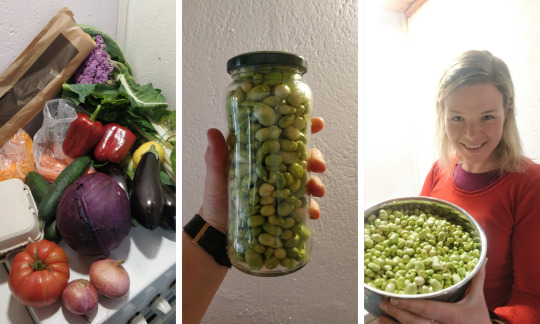
(images) Beautiful fresh veggies from the market were a highlight of the week, as well as picking these broad beans straight from the garden. The bowl on the right is what was distilled from podding four huge bags’ worth.
The resurgence in cooking and baking whilst in lockdown is inspiring, but I’ve been thinking about how it affects our supply chains as well.
Just this morning on BBC News I saw an article about dairy farmers having to throw away vast amounts of milk as cafes, hotels and restaurants remain shut, and another article about how there’s been an insane increase in demand for flour, as everyone takes to home baking. Many mills are now working around the clock to meet the demand in the UK and I was especially interested to read that even if there’s enough flour that there’s a shortage of packaging, because usually only 4% of flour produced goes into the smaller bags that we see on supermarket shelves.
Coronavirus has triggered so many changes in how we live and how we behave, that it's wreaking havoc on supply chains like this, and of course, the economy. That said, whilst the negative effects are hard to deny, scientists, economists and ecologists alike are suggesting that we should leverage the situation as an opportunity to reflect on how we all live, and how we might return to ‘normal’ life without just returning to business as usual. I agree: this is a unique opportunity to reassess production and consumption, how we assign value to things, and the economic and political models that we use to govern our world.
The connection between global lockdown, coronavirus, climate change and our economy has really got me thinking.
I recently read an incredible article by ecological economist Simon Mair in Singularity Hub which looked at this relationship. The article pulled together disparate strands that have been on my mind for a while, each related to various books which I’ve been reading, and which I can now see are interconnected. Simon suggests that the Covid-19 crisis could be a chance to “expand our economic imagination”. He explains that coronavirus, like climate change, demands a type of downscaling, counter to the ‘wartime economy’ mentality and massive upscaling of production.
“If we want to be more resilient to pandemics in the future (and to avoid the worst of climate change) we need a system capable of scaling back production in a way that doesn’t mean loss of livelihood”, says Simon.
The article is full of gems, and Simon explores things such as our current addition to economic growth and productivity, the transfer of healthcare and labour goods out of the market and into the hands of the state, and the social forms that could come from an ethic that values care, life, and democracy. It answers some of the questions posed by George Monbiot in ‘How Did We Get Into This Mess?’, echoes some of the radical economic theories proposed by Kate Raworth in ‘Doughnut Economics’, and parallels ideas of democratic market socialism put forward by ‘How to Be an Anti-Capitalist in the 21st Century’ by Erik Olin Wright which I’m currently reading. Simon’s article has really got me so fired up, in fact, that I’m working on an idea for a new video which explores the topic, so watch this space.

(images) Three fantastic books which I highly recommend.
On the subject of videos, Broaden has been one of the only things keeping us sane! I am eternally grateful to have a creative outlet in times like these, and one which involves a collaborative partnership with George too. Whilst we aren’t able to explore places in the van, or capture footage for new films as we’d love to be doing right now, we are at least able to edit from the cottage and work on promoting the content that we are already releasing.
It feels so tricky to get the right tone when releasing videos during a global pandemic.
We are both conscious of remaining sensitive to the severity of the health crisis, whilst balancing that with the reality that life goes on, and that people still want to see pictures, watch videos and read articles that engage with other topics too. As Broaden, George and I obviously made the decision to launch our documentary ‘The Hundred Miler’ during this time, and I hope that people see it as a celebration of running, the natural world, and human resilience, and perhaps even an escape from the daily news of the virus, rather than something insensitive or badly-timed.
youtube
(video) Trailer for ‘The Hundred Miler’
‘The Hundred Miler’ comes out this Saturday 11th April, and we have been overwhelmed by the response already. People have really got behind the project, helping to share it on Facebook, Instagram and YouTube and widen its potential reach. George has been making this film for well over three years, so it feels like an immense milestone to finally have it shown to the world. I don’t think I know many people who hold themselves to such high standards as George, and so to have so many positive messages and people planning to tune in for the live premier on Saturday is the best affirmation of all his hard work that I could wish for. It has been a pleasure to see him create this documentary, and also to have been involved in the production and final stages of its creation.
The Hundred Miler is a film about three Australian guys, taking on the biggest race of their lives; UTMB.
‘Ultra Trail du Mont Blanc’ is renowned in the trail-running world, as one of the most challenging and scenic ultra marathons. The Hundred Miler is an attempt to bring this story to the masses, and we hope that it appeals to non-runners and runners alike, for its underlying themes of companionship, commitment and strength. It premiers live on YouTube at 10am in the UK, which is 7pm in Australia on 11.4.20, and after that the video will be available to watch as a normal video. You can find BTS footage and more information about the film on our Instagram here, details of the launch on the Facebook event here, and the link for the video itself here. You can also subscribe to Broaden’s YouTube channel and set a reminder for when the film goes live.
youtube
(video) ‘The Hundred Miler’ which goes live on Sat 11th April.
It goes without saying: I am really missing the open road and living in a van. And I’m not immune to fear of the future either. But as the days and weeks pass, we learn to adapt to changing circumstances and continue to find hope among them. In a way, it helps to know we are all in the same boat, facing a topsy-turvy life full of roadblocks and revelations. Thanks for tuning in to read my weekly ramblings and I hope you’re all keeping as well as you can be. Until next week!
#thehundredmiler#traveldiaries#SuziTheVan#toyotahiace#hiacevan#overlandadventures#BryonyandGeorge#digitalnomads#vanliving#vanlife
1 note
·
View note
Photo
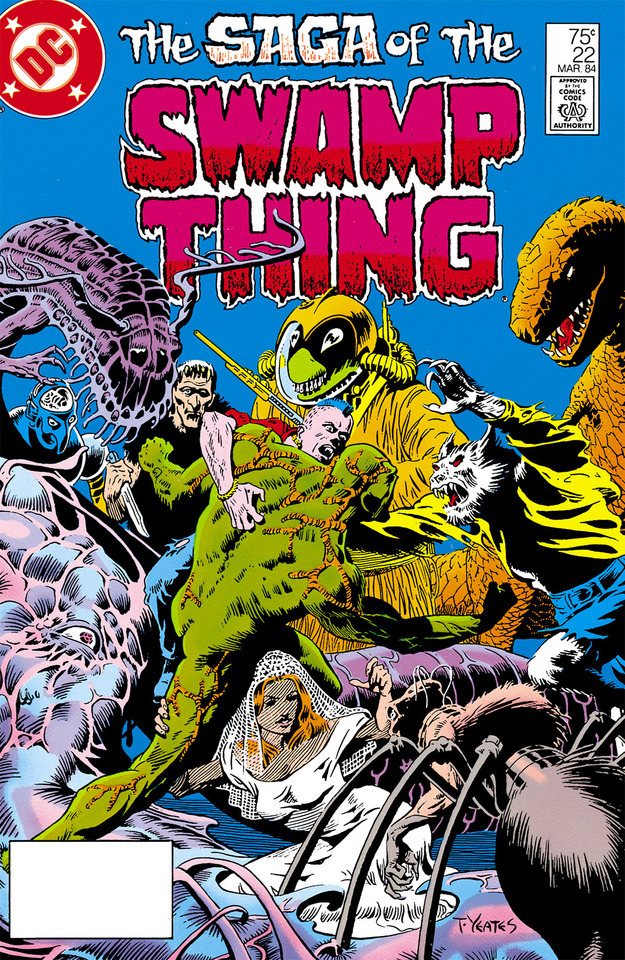
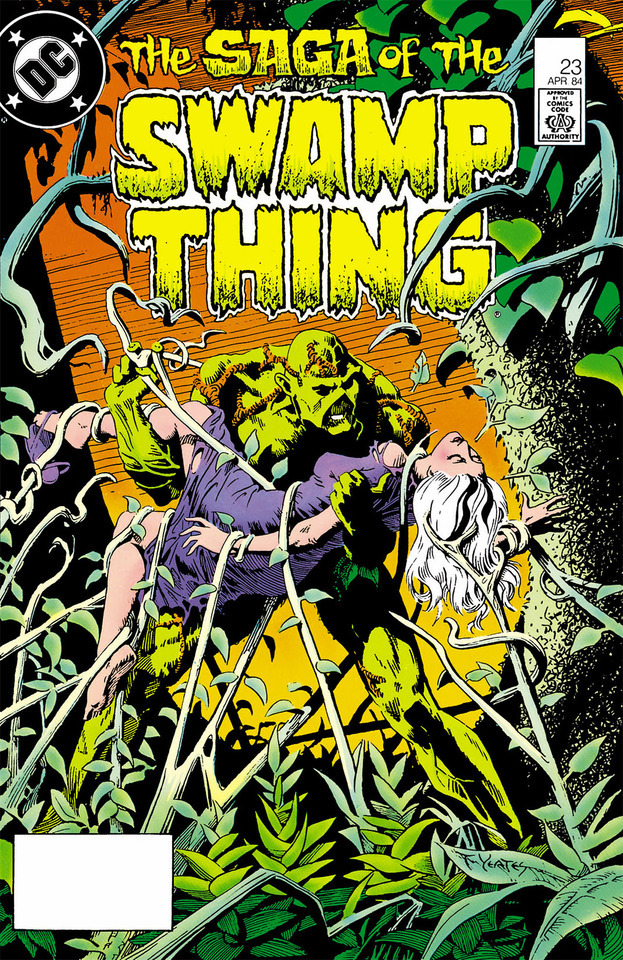
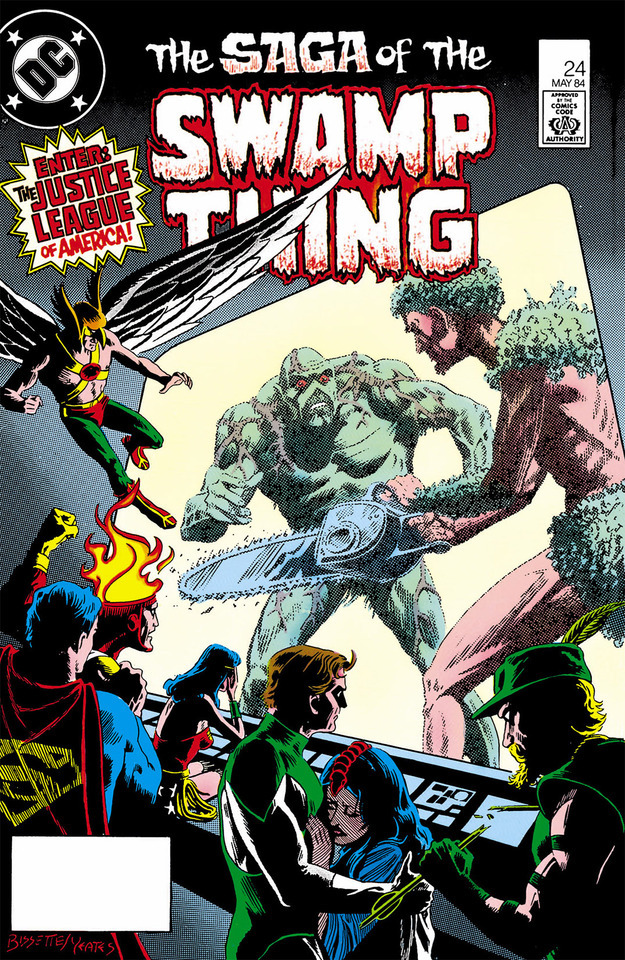
SWAMP THING #22-24
MARCH - MAY 1984
BY ALAN MOORE, STEVE BISSETTE, JOHN TOTLEBEN AND TATJANA WOOD
SYNOPSIS (FROM DC DATABASE)
Abby Cable and her husband Matt search the Louisiana swamp for Swamp Thing. They discover his body, but it has taken root in the swamp, and is seemingly unresponsive. They are accosted by Jason Woodrue, who explains how Swamp Thing had been captured by the Sunderland Corporation, where he had discovered that the Swamp Thing was never Alec Holland at all, but simply plant matter infected with Holland's consciousness. When Swamp thing discovered this, he escaped, and took root in the swamp, giving up his quest for humanity, and accepting his plant nature.
Meanwhile, Swamp Thing has surreal dreams of Alec Holland's life, and then his quest for humanity as the Swamp Thing. All the while, Woodrue performs experiments on him, hoping to connect to The Green through him. He goes so far as to eat one of the tubers growing from the Swamp Thing's body.
Elsewhere, Abby has anxiety over the thought of her husband being with another woman, but never finds any evidence. She drags Matt back to Swamp Things' resting place, shouting and crying, hoping to convince him to embrace his humanity. Woodrue, watching in the shadows, is disgusted.
Finally, Woodrue taps into The Green, and it strips him of all of his humanity. He embraces his new identity as the Floronic Man.
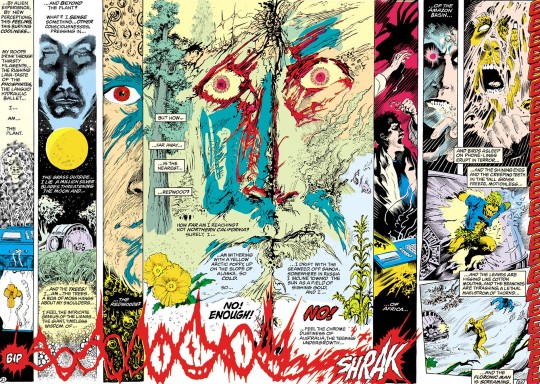
Swamp Thing is residing within The Green after the shock of discovering that he is merely composed of plant-matter that was somehow deceived into thinking that it was once the human Alec Holland.
Elsewhere, The Floronic Man, formerly Jason Woodrue, commanding the power of all plants, goes on a rampage of murder and destruction throughout Terrebonne Parish, Louisiana. Abby Cable drives alone, and discovers the bodies of some of Woodrue's victims, and in her fragile state, cries out for Alec, before being set upon by some of Woodrue's vines.
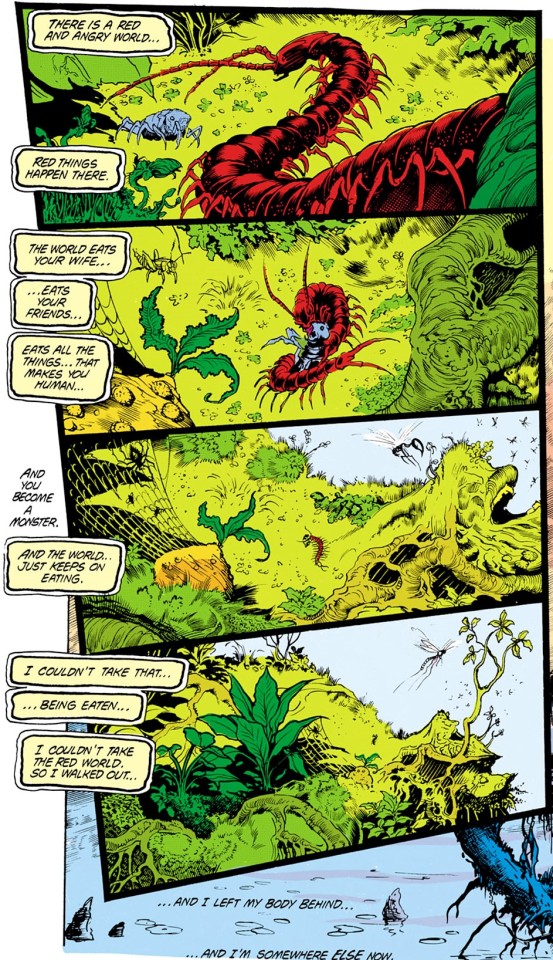
Woodrue uses plants to increase the oxygen levels within peoples' homes to the point that it causes an explosion when someone lights a cigarette, and destroys everything in the town. He has a local boy film everything, and then deliver the tape to the authorities. As a result, the authorities call the Justice League of America.

Through The Green, Swamp Thing hears Abby call to him, and begins to piece together recent events, coming to grips with the fact that he is not Alec Holland, and slowly beginning to perceiving Woodrue's negative presence within The Green.
As Woodrue's vines nearly strangle Abby to death, Swamp Thing finally wakes, and uproots himself, saving her. Then he goes to confront Woodrue himself.
The Justice League of America watches the tape they received depicting the attack on Terrebonne Parish, and try to formulate a plan of action. The Floronic Man has used his connection to The Green to kill humans in Lacroix, Louisiana, and plans to unbalance the earth's atmosphere by causing plants to produce more oxygen - and the inflammable gas will eventually ignite and kill all animal life.
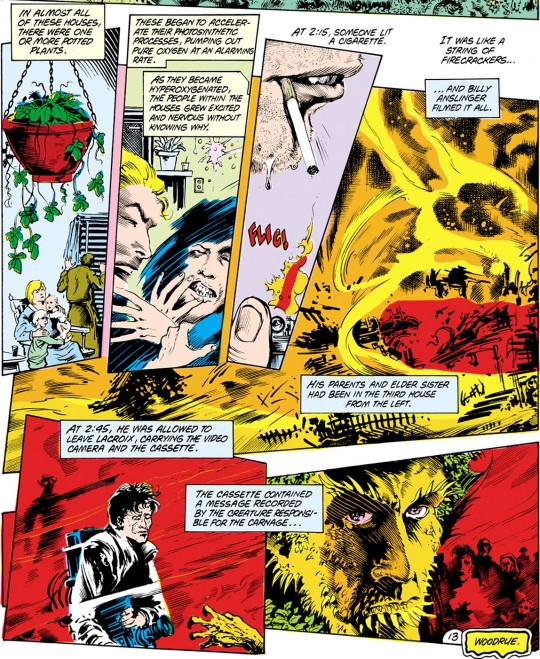
Meanwhile, the Swamp Thing confronts Woodrue. Initially, the madman assumes that Swamp Thing is joining him as a companion, since he also holds a connection to The Green. He offers the Swamp Thing the opportunity to kill a prone woman, but rather than join Woodrue, he punches him in the face, and rescues the woman. Angrily, Woodrue stabs Swamp Thing through the chest with a sharpened tree trunk.
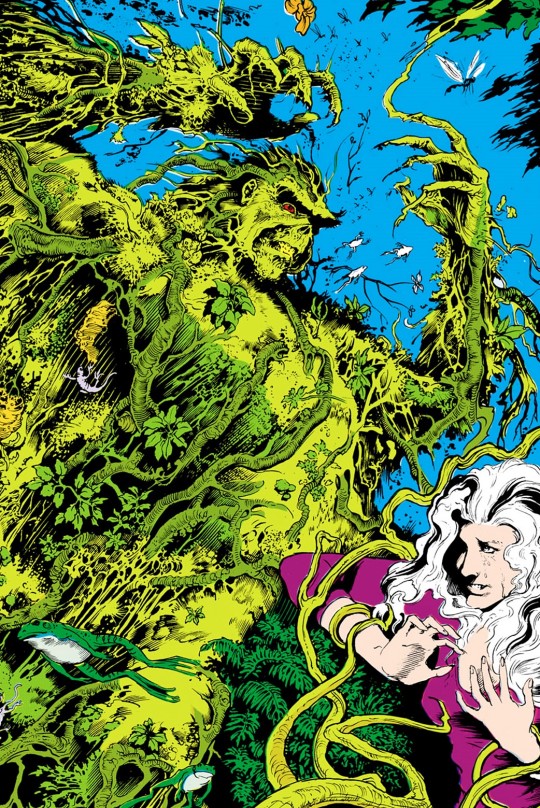
Noticing that the Swamp Thing and Woodrue are fighting against each other, the townspeople take the opportunity to escape. Nearby, Abby Cable meets an old man who refuses to admit defeat, and runs off to retrieve an object he calls 'Evangeline.' In the meantime, Woodrue traps Swamp Thing beneath some rubble, and suddenly becomes aware of Abby's presence. At that moment, though, the old man returns bearing a chainsaw.
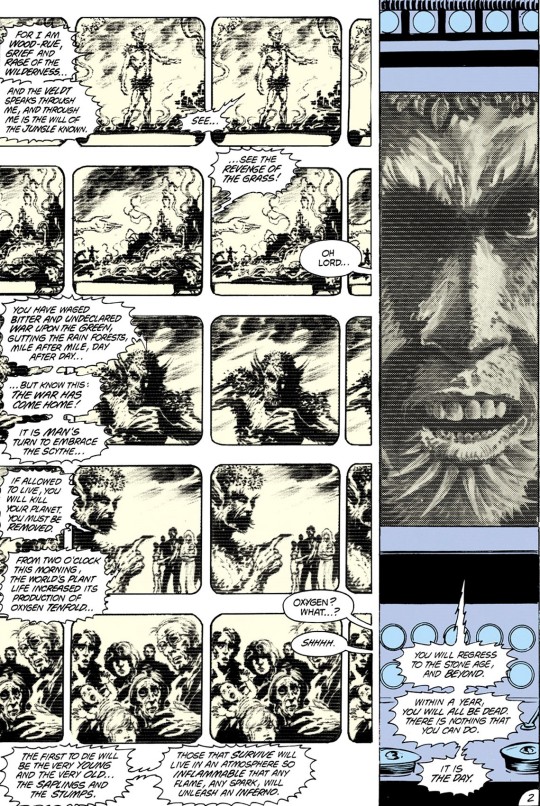


Woodrue kills the man before he can attack, and recalling her sympathies for Swamp Thing, who he deems a traitor, he decides to kill Abby with the chainsaw. As he raises his arms over his head, Swamp Thing grabs one of them, and snaps it. He explains to Woodrue that he is hurting The Green by his actions.
Woodrue is disbelieving, claiming that he is the servant of the Green, and that he has been carrying out the will of the wilderness. Swamp Thing responds that the carnage and destruction that Woodrue has caused are the way of man, and not the way of The Green. He says that Woodrue's illness has poisoned The Green with his desires. Finally, he causes Woodrue to realize his error by reminding him that plants require carbon dioxide, created by humans and animals, to continue producing oxygen and live. The realization causes The Green to draw away from Woodrue, leaving him alone. In horror, he runs away.

Abby remembers that the Swamp Thing said to her that he is not Alec Holland, whom she believed him to be. He responds that he has since learned that he is merely a plant that thought he was Alec Holland, and now, he is happy with that knowledge. Pleased, they embrace and return to Houma.

Desperately, Woodrue returns to the swamp, sensing that the Justice League is coming for him. He searches for his Flexi-Flesh spray, hoping to appear as a human before they arrive. Unfortunately, as Superman and Green Lantern approach him, he appears before them as a grotesque version of his former self; as his spray flexi-flesh spray has worn off. His mental state is fragile, and Superman and Green Lantern take him to Arkham Asylum, hoping he can get help there.

The Swamp Thing returns to his swamp, wondering why he would ever have left it, and finally embracing his life as a plant, and not a man.
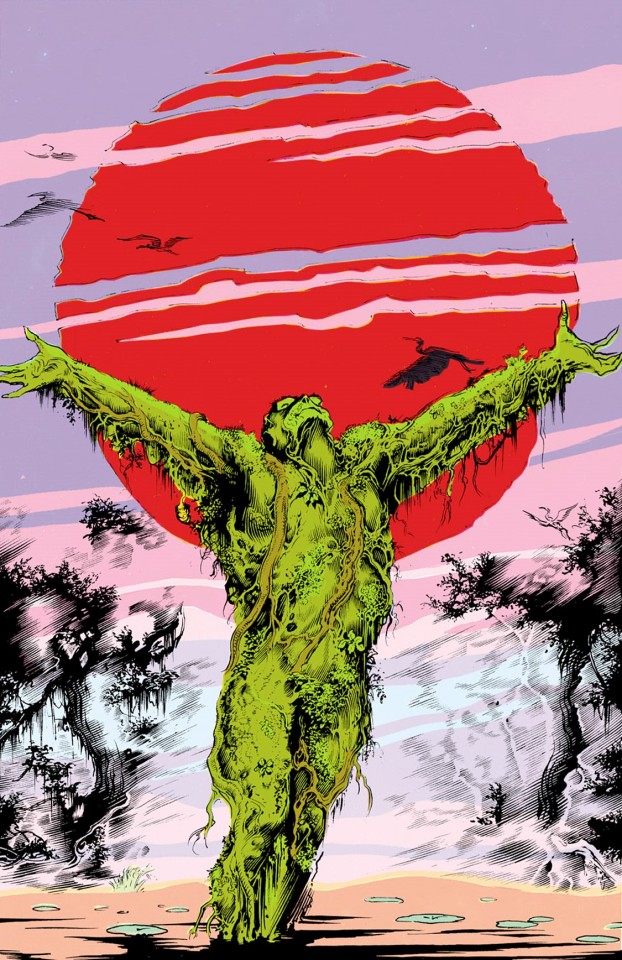
REVIEW
If you are more familiar with this version of the Swamp Thing, this story will be awesome for you. But I wonder how people at the time felt about this change, as it stripped away all of Alex Holland from the main character.
In any case, this is a beautiful story both in writing and art (with a lot of symbolism hidden on plain sight). And this war between the Green and the Red is something we can all relate to. There is a sequence when a policeman comes back home knowing what’s about to happen and starts killing all the plants around his family, this is a primal war for existence, a war neither the green nor the red can win. A war that echoes the Cold War of the time, where one power winning over the other would doom the planet.
Swamp Thing went through his Apotheosis in this book since issue 20. And now he became a plant, a proud one. And you could think of issue 24 as the conclusion of more than 10 years of stories. It really is. There are even multiple references to previous issues from both Pasko and Wein’s runs, but without interfering with Moore’s story.
But the Swamp Thing world just got bigger, and with it, new opportunities for stories.
I give this story a score of 10
#tom yeates#swamp thing#dc comics#comics#review#1984#modern age#the green#the red#floronic man#justice league of america#justice league#jla#wonder woman#hawkman#superman#firestorm#green lantern#zatanna#green arrow#the flash#aquaman
19 notes
·
View notes